Top 10 Interview Questions For Yacht Crew & How To Answer Them
Whether it’s your first interview or fiftieth, it’s always a good idea to be well rested and prepared. To help our crew candidates nail their next interview, we’ve compiled a list of the top 10 most popular interview questions for working on yachts and superyachts with helpful tips on how to answer them.

What about your current position do you dislike?
With this question, it’s very important to remain professional but be honest. For example, a good answer would be “ I enjoy the yacht and crew however; the role does not challenge me and I am frustrated not stepping up to a bigger role .”
What are the elements that your perfect job would be made up of?
The top four things we would suggest would be; Great Owner, Crew, Terms and Travel.
What gives you the highest level of job satisfaction?
Rather than focusing solely on the personal aspects that you could answer with think about, think about the customer such as “ Happy guests after a trip and getting to be on a beach with friends when time allows ”.
Tell me about your last three jobs.
Rather than going through the ins and outs of each job, choose factors such as how you were managed and personal relationships with people, your career path and personal development within those jobs.
Why did you take each position? Why did you leave each?
Be honest with this question as reference checking will unearth any skeletons. If you needed seatime or wanted to explore the Pacific, tell your interviewer.
If I offered you your ideal job today, what factors would delay you taking that job immediately?
This questions always puts you on the spot and under pressure. Answering can I have 24 hours to think it over, will show methodical thinking. This is not an opportunity to inform the yacht you are waiting on another offer and you will take the higher. Do however tell the interviewer you are speaking with another yacht.
What is the most significant impact you’ve had on your current workplace in the last year?
There are potentially two avenues you can take with this, you can show personality or show a professional contribution. Personality – “ I brought together the departments and boosted morale by ….. organising dinner, hikes, sailing” . Or a professional answer highlight such as “ I amended safety procedures onboard, aligned budgets and developed a new work rota ”.
How have you improved yourself in the last year?
Take this as an opportunity to sell yourself; outline what courses you have taken and why. Explain how you have reflected on your workmanship since leaving your last yacht, e.g. you will be more detailed / assertive / relaxed / mature / disciplined.
What would your previous employers say about you?
As it’s often difficult to review how others perceive you, repeat was has been mentioned during your appraisals and reviews. I hope they would say I am reliable, someone they would rehire, however avoid the clichéd answers.
Tell me a little about your personality.
This is another opportunity to sell yourself. Try and navigate away from clichés and think what really makes you as a person stand out. Remember your answer may come back to haunt you.
If there is anything else you would like to discuss regarding your upcoming interview, please don’t hesitate to get in contact with us.
We’re here to help
Elan House, 5a Little Park Farm Road, Fareham, Hampshire PO15 5SJ

Top 10 Interview Questions for Yacht Crew
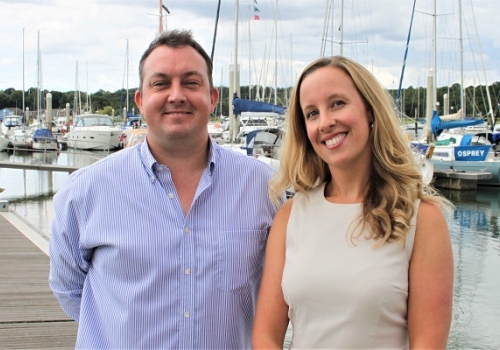
When it comes to hiring superyacht crew, it's important to find candidates who will not only perform their job to a high standard, but who will also fit well with the rest of the crew, whilst living and working together in close quarters.
There are several key elements to consider in the recruitment process, but one of the most important is the interview. Asking the right questions can help you asses their skills and experience as well as giving you a better understanding of their interpersonal skills and problem-solving abilities. It allows you to get a feel for whether or not a candidate is qualified, but also if they’re someone who will complement your exiting team and someone who other crew members would enjoy working with.
It’s not always an easy task but the team at wilsonhalligan crew recruitment have shared some examples of top interview questions that you could use to learn more about the applicant…
When interviewing try to follow the 80/20 rule where you, as the interviewer, do 80 per cent of the listening and 20 per cent of the talking. Start with some general questions to establish the candidate’s interest in the position and their previous experience. Ask them to tell you why they think they would be a good fit for the role and what they could contribute. Applicants should also be given time to ask you any questions that they may have. Remember that their questions can also help you assess their interest in the role and if they will be a good fit for your team
1. What do you know about the yacht and the position on offer?
A great opening question to determine whether a candidate is serious about the job on offer or has just applied to any vacant position. Of course it’s not always possible for a candidate to know much about a yacht due to confidentiality, but they should have taken time to learn as much as they can and be fully aware of the role they have applied for. This question also offers a good opportunity for you to then explain the position in a little more detail.
2. Can you tell me about your responsibilities in your previous role?
This question can help you evaluate the candidate’s communication skills and give you a more in-depth insight into their background, skills and experience. You can go on to ask them how they would handle certain situations or challenges relevant to the yacht or position you are recruiting for.
3. What skills and experience can you bring to this position?
Have they considered what you are looking for and how they can benefit the yacht and crew? If they are new to the yachting industry, have they considered how their previous skills and experiences could be transferred to yachts? Are they able to think critically about their abilities and experience within the role?
4. Why are you looking for a new position?
Yachting contracts are often short or terminated due to a change in circumstances with the yacht or owner, however reasons such as lack of career development or problems with management or crew can mean they are unhappy in their current role. Does the job you have available offer an alternative to these issues? Will they be happier on your yacht?
5. How would your fellow crew members describe you?
A key question in assessing how they might work with other members of the crew. Be on the lookout for candidates that will compliment your existing team both professionally and socially.
6. Can you tell me a time you had a disagreement on board and how you handled it?
You can tailor this question to be more specific to the position on offer and the answer will give you a sense of their ability to handle conflict and resolve issues. Did they handle the situation well? Did they remain professional? How do they speak about the other individuals involved?
7. Can you describe how you handle quick turnarounds?
A busy yachting season consists of long hours and little downtime. Are you looking for someone who can work quickly and under pressure? Are they able to overcome challenges calmly and rationally? Can they work independently and remain well organised? Think about tailoring this question to the specific role on offer.
8. What’s the most interesting or enjoyable job you have had?
Leaning what the candidate enjoyed most about a previous job can help you understand their interests and motivation, what they are hoping to gain from this new position and what will offer them job satisfaction.
9. Where do you see yourself in five years?
People join the yachting industry for many reasons, for some it is long term career whilst for others it is a short-term experience to travel and earn money. Establishing their future goals can help you asses whether they are suited to the role. For example a candidate who is interested in career development is more likely to offer longevity if there is opportunity for further training and a chance to step up to a more senior role in time.
10. What’s one fact we should know about you that is not on your CV?
A great open-ended question which can lead to conversations about a candidate’s background, their hobbies or interests, and can give you a sense of who they are as a person and how they might fit in with the rest of the crew.
The team at wilsonhalligan Recruitment are always on had to help with your recruitment needs. If you would like any advice or guidance on sourcing suitable candidates, the interview process or reference checking please do not hesitate to get in touch.
For more examples of Interview Questions read: Top 10 Interview Questions for Yacht Crew & How to Answer Them

Post your comment
You cannot post comments until you have logged in.
Comment by: Mellisa Altenburger - 12 Jan 2022, 18:35 (2 years ago)
Very helpful article, thank you!
No one has commented on this page yet.
RSS feed for comments on this page | RSS feed for all comments
Search articles with keywords
LISTEN TO THE PODCAST
Free masterclass, yachting courses, watch my free live masterclass "how to get a job on a yacht" .

back to blog
7 Ways To Nail Your First 7 Days As A Yacht Stew.
Freebie alert: Junior Stews Download now
![[PenelopeTemplate]taylor-simpson-azI_KfAnC8E-unsplash martini mondays public relations and strategy brisbane](https://static.showit.co/400/-j3kPzfNRjm8JSippHi7Dw/shared/penelopetemplate_taylor-simpson-azi_kfanc8e-unsplash.jpg)
Blog Categories
Superyacht jobs, life onboard, about yachting, listen now.
Hear about the real yacht life, info on how to kickstart your superyacht career and tips on becoming a super stew.
The Seaworthy Stew: Podcast
![[PenelopeTemplate]content-pixie-VIh-B-bNZMc-unsplash martini mondays public relations and strategy brisbane](https://static.showit.co/400/sgOjawVZS0WmIQiKY2Ntrg/shared/penelopetemplate_content-pixie-vih-b-bnzmc-unsplash.jpg)
A Chief Stew with 6+ years experience in the superyacht industry. I help aspiring crew confidently land their first job and teach the skills needed to be a stand out YACHT STEW.
Hey, I'm Jess

5 Yachting Interview Questions to Ask (& What Not To Say
Superyacht jobs, filed under:.

Tune in via
Listen now- check out the seaworthy stew podcast here.
An exciting (and nerve-wracking) part of getting your first yachting job is getting the call or email to say you’ve been short-listed for an interview.
You may wonder how to prepare for your yachting interview. In this post I share 5 questions to ask in your interview and why. It will give you a good insight into the yacht you’re being interviewed for.
An interview is as much of a decider for you as it is for the boat to see if you would be suitable for the role. After all, I don’t want you to get on a poorly run vessel so I’m hoping these questions will allow you to sort through and find a great boat.
Your interview could be with the recruitment agency or with the crew on the yacht such as Chief Stew or Captain. It is also possible that you may do several interviews one with the recruitment agency, one with the chief stew and then one with the captain to get the final approval.
5 Yachting Interview Questions To Ask:
- How many crew onboard? This question will give you a good idea as to if the boat is run with minimal crew. To perform duties to a superyacht standard, yachts need a certain amount of crew. If a yacht is run with not enough crew it means you probably won’t be getting the hours of rest you’re legally supposed to and it can’t afford to pay enough crew so the budget will be tight, which affects crew food, and toiletries etc.
- Is the role permanent or seasonal? Is the yacht dual Season? These questions will determine if you’ll be looking for another job at the end of the season or if you’ll be onboard permanently. There are pros and cons to working on a seasonal yacht – you can travel after the season as you’re usually cashed up and you are not tied to the boat for a long time if you have other commitments however you also can’t get great longevity from a seasonal yacht and this is something highly valued in the industry. It is also worth asking if the yacht is dual-season (using this yachtie language is also a bonus). This means the yacht does both the Med and the Caribbean season and you’ll get to experience both seasons which is a must in my eyes.
- What is the longevity like for the crew onboard? This is a great indicator of how well run and great a yacht is to work on. If you have crew coming and going all the time with less than a year on board that is a sign that something could be going on with management the owner or the head of department. If the crew have been on for years it shows that the crew like their job.
- What activities do the crew do together outside of work? This gives you an idea of the crew culture onboard to see if it’s a good fit for you. There are different types of crew on superyachts, there are the fit boats and the crew can be found eating really well, gymming onboard, doing hikes in their downtime, and exploring in nature. Drinking is not a priority. Then there are the party-goers, when guests are off they are hitting it hard, partying in the local bars, back on the boat, rocking up with hangovers at work, and the end goal is to go hard or go home, it’s not unheard of for crew to be using cocaine in these environments. Then there are boats with a well-balanced crew who enjoy each other’s company, enjoy a drink after work and explore the local area on the weekend. Whatever you enjoy doing see if it fits in with what the crew like to do.
- Instead of asking where the boat will go or who the owner is, ask what kind of program does the boat have? This question allows you to get an insight into: a) If it is heavily used for charter/boss trips, sometimes yachts say they are private/charter yet they only charter once a year because the price to rent the boat is so much. This can affect your salary as generally speaking charter yachts pay crew a little less than private as they factor in tips. So if the pay isn’t great and the boat says “well it’s charter you will get tips”, yet they never charter you’re taking a pay cut for that. b) If the yacht has a live aboard owner, meaning you’re ‘always’ on charter. c) If the boat is always at anchor it means access to shore-time is limited as you need to get a tender ashore. This also can indicate that the boat doesn’t pay to be in port, which can mean a small budget however it can also be that the boat is too big to fit in port for example the well-known 162m superyacht yacht Eclipse cannot fit into many ports, so it is always at anchor. d) If it is world cruising meaning you may get to travel to some places which are out of the general ‘milk run’ routes such as Capri and Monaco. I’ve had friends travel to some incredible places on world cruising yachts even as far afield as Antarctica. However, with these world travelling yachts it can generally mean you’re not out socialising and meeting other crew as much as you’re exploring so it really depends on what you want you’re yachting adventure to be like. I will say with the world cruising yachts crew, you will spend a lot of time with your crew so try and get a good idea of what type of people they are, nationalities, hobbies etc.
Questions NOT to ask in an interview:
- Who are the owners? The person interviewing you will probably reveal the owner’s nationality, what kind of service they do and if it’s a family-run, business-like or party environment. With a little research after your interview, I’m sure you can find out more information about the yacht.
- Do I get the weekends off? This is an alarm bell for a Chief Stew as it says a lot about the person interviewing and thinking more about the time off then the work. All crew get time off yes, and your contract will specifically say how many days and your package details.
- Is there a drug test and how often? Drug tests onboard are pretty common, they can be random checks or they can be every time you get back from holidays. Don’t ask this in an interview it says lots about you as a person.
- How much will I get paid? I encourage you to let the interviewer bring this up with you. I know it’s a big part of the job however let them tell you all about the job first then tell you the package details. Make sure you get a contract before you join a vessel with your pay details and flight packages, if it hasn’t been organised then you will need to ask about the pay.
Want to learn more about how to get a job on a superyacht? Check out my free eBook “Your First Steps To Yachting” grab it here
Want to build up your stewardess skills with an on-demand stewardess training course? Check out The Seaworthy Yacht Stew Training Course here

listen to the podcast
About .
I’m a chief stewardess with over 6 years experience working in the superyacht industry on boats up to 88m. I help aspiring yacht crew by propelling them with the know-how and tools to confidently break into the superyacht industry.
Hey, I'm Jess a friendly Yacht Stew here to help!

@THESEAWORTHYSTEW

privacy & terms
© 2020 the seaworthy stew, masterclass, listen on the podcast.
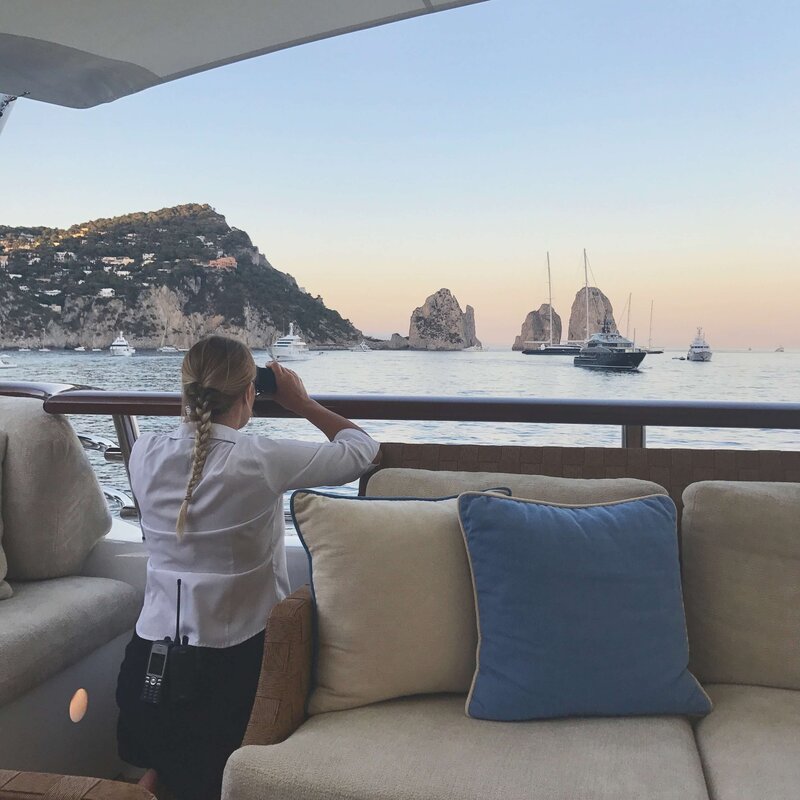
welcome, friend
Essential Guides
Ocean Mapping
New to Yachting
- May 10, 2021
Yacht interviews can be stressful, but they are also your opportunity to shine. So many yacht crew looking for work never get to this point so make sure you use this chance to its full potential. To help with that, our experienced recruiters are bringing you some interview tips to use and remember.
1. Make sure to know the name of the interviewer/interviewers and call them by their respective name when you introduce yourself. When you’re looking for work, make a point of answering your phone in a professional manner at all times. “Hello, Marjorie speaking”. It’s such a small detail, but it will instantly score you some points as you’ll come across as switched on. Too many people answer their phones with a dreary and low-toned “hello” which is really off-putting to an interviewer.
MARJORIE BAILLET - Engineering Recruiter

2. These days most interviews take place by phone or video calls so, just like you would have done in 2019, make sure you’re on time, or even better arrive early, log in a few minutes before the scheduled time. Ensure your backdrop is suitable, your sound and video are working correctly.
FIONA MURRAY - Head of Deckhand and Bosun Department

3. Be mindful of your body language whether you are interviewing in person or via video call. You can say all the right things at an interview but you also need to have coherent body language to go with it. I have seen top captains nervously playing with a pen or wiggling on a chair in the middle of an interview instead of taking a moment to compose and focus on the conversation.
ULRICA LINDSTROM - Head of Deck Department

4. Take some time before the interview to think about the position that you are interviewing for and prepare a few questions you would like to ask. This will help the interview flow nicely and it will show that you are interested in the position. Here are a few examples: “What’s the best thing about working on this yacht?”, “Are there any specific aspects of the job that I should be aware of?“, “ Why has the last person left the job? “, “What is the next step after this call? “.
ANNA HORAK - Engineering Recruiter

5. Listen to your recruiter 😊. Recruiters are specialists who know their market extremely well and know what it takes to get to the interview stage and then to the job offer stage. We champion candidates and when we share advice on topics such as CVs or food photos, it’s not to be a pain, it’s because we want to secure you your dream job! We know the process and we enjoy guiding you to success.
HELEN PAPAMICHAEL - Head of Interior Department and Chef Recruiter

6. Get prepared! Read over your CV beforehand and highlight in pen or pencil the things you are proud of and the things you think are relevant for the position, so that you can talk about these when asked, without panicking. There is nothing worse than thinking afterwards ‘Aaah! I should have said that!’.
LOUISE OVEREND - Interior recruitment consultant specialising in Junior Stew, Nurses and Spa Therapists recruitment

7. You can hear a smile – have you ever thought about that? When you smile talking on the phone, you sound warm and friendly, not flat. As telephone interviews have become the norm, this advice is more pertinent than ever. Also, when you smile, on Zoom, for instance, it is your whole attitude that will shift – it’s unlikely you’ll be slumped on a chair when you’re smiling. You’ll automatically sit straighter and be more engaging with your interviewer.
ALEXANDRA O'CONNELL - Deckhands and Bosuns Department

8. Remember this is your opportunity to shine. Tell the interviewer what you can bring to the table, what your key attributes are and why they should hire you above the other shortlisted candidates. Top tip – do not ask about the salary! Leave that to the discretion of the interviewer. If you have made a good impression, they will then move on to discuss terms later.
JACQUI YOUNG - Head of Engineering Department

9. Look your interviewer in the eyes while speaking to them. It is very important to maintain eye contact with the person facing you. If there is more than one interviewer make sure you give them equal attention, even if one is not interacting.
ANNABELLE HUVELIN - Interior Recruiter specialising in Chief Stew and Purser recruitment

10. No one is amazing at everything and it’s refreshing to have an honest chat, so don’t be afraid to speak about what you’re not good at. “Do you have any reservations about my application”? This is an old-time favourite and will be an absolute winner – by asking this question you demonstrate that you are interested and keen on the job and also that you are confident in yourself and not afraid of rejection. It allows you to address the doubts that the interviewer has about you and it’s your chance to put their fears to rest. Its a powerful question and one of my favourite “Top Tips”.
LISA FROST - Captain’s Department

11. Keep positive and listen with attention to the questions, take your time to respond with clear motivations on why you are the best person for that particular position/yacht.
CHLOE COLLET - Captain’s Department

Are you ready to find your new dream job onboard a yacht?
Become a member of YPI CREW through a free registration and let us connect you with the next step in your career.
Each of our recruiters is specialised in recruitment for a particular department and they will do their best to get you an interview onboard a yacht. They will also advise qualified crew how to best present their CV and prepare for a yacht job interview.
Are you looking for yacht crew for your yacht?
Get in touch with us so our recruiters can connect you with suitable, available and interested candidates, each of which will be checked, certified, pre-interviewed and ensured to be a perfect fit to your existing crew.
You can get in touch with us today by clicking here .
Most read articles

Tips & Tricks
How many crew members are needed on a yacht?

How to Find A Caribbean Yacht Job

Yacht Job Offers
Open yacht crew jobs in March 2023

How to Become A Yacht Purser: Interview with Purser Trainer Angela Wallace

YACHT CREW GUIDES
IS YACHTING THE RIGHT CHOICE FOR ME?
Essential yacht guides

Mandatory certificates

What you need to know about B1/B2 visa

How to prepare for a yacht interview?
Read more latest news

YPI CREW Will be Attending the Superyacht Technology Network Conference in Barcelona

Is a career in the yachting industry a good fit for me?

Webinar Friday, 15th March: How to Start Your Yachting Career as a Superyacht Stew?

11 Yacht Interview Tips from Professional Recruiters
TIPS & TRICKS

HOW TO WRITE A MEMORABLE YACHTING CV

YACHT CREW SALARY GUIDE
Error 404 — page not found, we’re sorry, we couldn’t find what you were looking for.
Please return to the YPI CREW homepage
Let’s get started. Call us on +33 (0)4 92 90 46 10 or email us.
Our mission, vision and values, mlc 2006 compliance, essential guides, yacht crew positions.
Chief Officer
Second Officer
Third Officer
Chief Engineer
Interior Crew
Head of Service
Head of Housekeeping
Specialist Positions
Spa Manager
Spa Therapist
Personal Trainer & Yoga Instructor
Hairdresser
Mandatory Certificates
B1/b2 visa information, how to write a memorable cv, how to prepare for an interview, yachting seasons, yacht crew salary guide, is yachting the right choice for me, cv templates, ocean mapping, new to yachting.
+33 (0)4 92 90 46 10
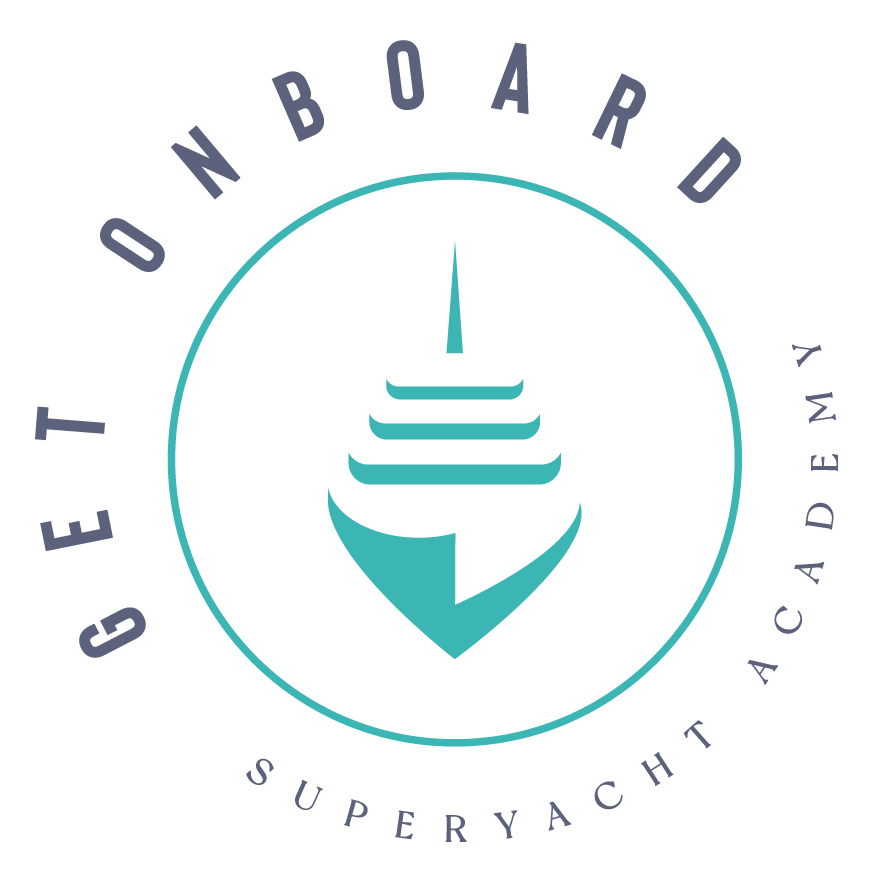
Get Onboard
Superyacht Training

Yacht Job Interview: How to Impress the Captain
There is no one-size-fits-all approach to knowing what captains or owners of luxury yachts are looking for in yacht staff, as each yacht is different. There are a few key things, however, to keep in mind and help you prepare for an interview. It is quite important for captains or owners of yachts to be very selective with who they choose to hire; a crew with good interpersonal skills can make all the difference for a successful charter.
What they are looking for in yacht crew depends on a number of things, including, but not limited to:
- How long the voyage is
- Who is onboard
- Where they are sailing
- The type of vessel
- And of course, the particular position you’re applying for
Skillset, the required yacht crew certificates, and training are vital, but it’s the combination of personality plus skill that makes for the perfect candidate. During the interview the interviewer will set out to distinguish a candidate’s strengths, motivation, and cultural fit on-board. Questions (and therefore answers) should be indirectly formulated to prove the following points:
- Can the candidate do the job?
- Will they enjoy doing the job?
- Will they be easy to work and live with?
Here are a few extras to keep in mind before going for your interview:
What to wear.
Yacht crew are usually given a standard uniform to wear during the charter. First impressions are extremely important, so pay extra attention to your attire, and smile.
- Wear a clean, crisp white polo shirt or t-shirt with beige or navy trousers or skirt.
- Wear your hair up, neat, and tidy.
- Look natural. Avoid heavy makeup and men should be clean-shaven with a trimmed haircut. Remove any facial piercings.
- Have clean, shaped nails and be well groomed.
- Body language is also very important – smile, sit up straight, and keep your head held high.
Common questions to prepare for
- “Tell me about yourself.” – A very common question even outside of yacht job interviews. Not only an ice-breaker, but your time to shine. If answered well, it will unquestionably increase your chances of obtaining a job offer. You will need to provide a coherent answer that has been prepared well in advance of the interview. Keep it to-the-point – two to three minutes is a good amount of time. Focus on past accomplishments and provide facts where you are able. If you have never worked as a yacht crew member before, don’t stress, you were chosen to be interviewed for a reason, so speak about any other skills you picked up along the way that may be relevant.
- “Why do you want to work on a yacht?” – This is a tricky one and the answer should never focus on you, but rather what you can bring to the table. Highlight your past experiences and skills that could assist the captain. Do no reference Below Deck as your motivation, this will not go down well.
- “Why should we hire you?” – This is again the chance to shine and deliver your final convincing argument. Keep it succinct and try to cover three things: convey that you are a solution to a recruitment problem, that your skills set sets you apart from the crowd, and that you meet the employer’s needs for this position.
- “Do you have any questions?” – These should be appropriate to the job you are applying for, and ideally not about the salary. Ask about the yacht, the crew, your duties, and the itinerary to show that you have a genuine interest in the role and its specifics.
Additional tips to help you shine
- Be confident and approachable in your demeanour.
- Convey resilience, commitment, and team spirit.
- Turn your mobile phone off before the interview.
- Show that you are eager to learn.
- If you are keen to take the job, say so and communicate that you will represent the yacht well – just don’t come across as desperate.
- Remember to thank the captain/interviewer for their time.
- Be ready to move quickly, yacht jobs are usually short-notice or sometimes same-day recruitment requests!
During the interview, you are also deciding whether this yacht will be the right fit for you. The key is to come across as competent, confident, and friendly, even if it is immediately apparent to you that you might not be interested in the position in question. In future the captain or crew agent who interviewed you may have a different position for which you could be the perfect candidate, so always impress!
If you would like more one-on-one guidance to prepare for your interview, get in touch with us to set up a consultation. We would love to help you ace your yacht job interview!
Needing more?
Error: Contact form not found.
RYA/MCA Online
1. what are the basic requirements you need to be eligible to work in the yachting industry, 2. what is the stcw and why do i need it, 3. what is the eng1 medical certificate, 4. what land based experience will help me find a super yacht job, 5. what are the different departments onboard, 6. what crew training is required for me to work as a junior deckhand.
- Yachtmaster/Coastal Skipper Theory
- Yachtmaster/Coastal Practical
- Specialist Super Yacht Training Course (Deck Hand Training Course)
- RYA Power Boat Level II
- RYA Personal Watercraft Course
- RYA Competent Crew Certificate
- RYA Day Skipper Theory and Practical Certificates
- VHF Radio Operator’s License
7. What crew training is required for me to work as a junior stewardess?
- Stewardess Course
- Proficiency in Designated Security Duties (PDSD)
- MCA Food Safety Level 2
- RYA Powerboat Level 2
8. How do I book my training courses?
9. how do i get my first job on a yacht, 10. are these courses worth it, or am i just wasting my money, 11. will i get hired for my first job from south africa, 12. what is daywork, 13. what are the best locations to get a yacht job, 14. how much can a motor yacht stewardess or deckhand earn, 15. what are the negatives of working on a yacht, 16. what are the positives of working on a yacht, 17. is working on a super yacht for everyone, 18. what is the minimum age to work on a yacht, 19. is accommodation provided when i am completing my yacht training in cape town.
- Bottom Painting & Prop Speed
- Fiberglass & Paint Work
- Running Gear & Valves
- Full-Service Team
- Monthly Maintenance Programs
- Dockside Service Team
- Full-Service Boatyard
- Management Services
- Accounting & Reporting
- Relevant Management Experience
- News and Media
Tips to Use When Interviewing for a Yacht Job

There is a large amount of competition in the yacht industry job market. With experienced yacht crews and newcomers coming aboard, patience is key to finding a yacht crew job.
When it comes to getting a job in the yacht industry, the most important thing to know is that first impressions are everything. Whether you plan on interviewing for a position on a yacht as a marine mechanic or as part of the yacht crew, here are some of the most important interview tips for getting a job on a yacht from our South Florida marina and yacht maintenance company!
How to Get a Job on a Yacht
To be hired on a yacht with no experience, the key is to be in the right place at the right time. Consider finding a yacht crew placement consultant that can help guide you to getting a job on a yacht that best fits your abilities and goals. Our boat hull painting in Miami recommends having a professional resume that highlights your skills and maritime knowledge, including awards, licenses, and certifications you have received.
Another way to easily get a job on a yacht is ensuring you have your STCW certification, also known as the “Standards of Training and Certification of Watchkeeping.” It is a mandated course determined by the International Maritime Organization (IMO) for all flag states in the U.S. It is also the international standard for almost every leading flag state in the world, making it a very important certification to have in the industry.
Consider surrounding yourself with the maritime industry and finding creative and professional ways to build references throughout your daily work. This is a great tip for getting a job on a yacht for those who wish to get more involved within the maritime community and learn more about different yachts and positions.
What Job Positions Are There on a Yacht?
It can be difficult to know which yacht crew position is right for you when getting a job on a yacht. The key to knowing the different positions on a yacht is understanding your goals for being a part of a yacht crew. You will want to ensure you find a position that you enjoy and are capable of handling.
Depending on the size of the yacht or superyacht, you may be assigned to a larger crew. The bigger the yacht, the more assistance the owner will need with maintaining, servicing, and chartering their boat. Here are some popular yacht crew positions you can find within the maritime industry.
- First Officer
- Second Officer / Mate
- Chief Engineer
- Second Engineer
- Third Engineer
- AV IT Engineer
- Left Deckhand
- Second Chef
- Crew Chef
- Interior Manager
- Marine Mechanic
- Marine Electrician
Superyacht Interview Tips
If you plan on applying for a job on a yacht, here are some interview tips to help get you the position! At Yacht Management, a South Florida yacht management company, we take our yacht crew interviewing very seriously and base our hires on the following interview techniques for working on a superyacht we manage.
- First impressions are everything, so ensure that you are in a pristine position and put yourself in the best light.
- Dress the part. Yacht crew attire includes a crisp polo shirt with shorts or a skirt. Be sure you have the right clothes for getting a job on a yacht.
- Do your research on the yacht company you wish to work for. If you are aware of the name of the superyacht, look it up and show the interviewer how interested you are in working on the vessel. Ask plenty of questions to help drive your interest to the employer.
- Be sure to express honesty and positivity throughout the interview process as well as showcase your initiative, confidence, and commitment to teamwork. After all, a yacht crew isn’t a one-person show as you will be working with other crew members aboard.
- Communicate well with your interviewer, be attentive, listen, and show genuine interest in the employer. When hiring a yacht crew, we also look for eye contact and body language to ensure that the crew member is a good fit for the job.
Working for a Fort Lauderdale, Yacht Management Company
At Yacht Management, we are constantly looking to hire new crew members that are looking for careers in the yacht industry . We offer boat bottom cleaning services , gelcoat refinishing , and a wide range of yacht maintenance services to ensure that our clients’ yachts are working at their full potential. Our yacht mechanics perform various installations and repairs to equipment and machinery as needed, using hand and power tools to help get the job done seamlessly.
Contact us today to learn more about our Fort Lauderdale yacht management services , and be sure to ask about how often you need to varnish a boat deck to learn more before scheduling your next maintenance call!
Additional Readings:
Boat Beehive Removal in South Florida
Guide to Vessel Haul Outs
Best Paint for Fiberglass Boats

For all inquiries, fill out the form below and a member of our team will respond as soon as possible

By Wilsonhalligan Yacht Recruitment 22 Jun 2017
Top 10 Interview Questions For Yacht Crew How To Answer Them
Whether it’s your first interview or fiftieth, it’s always a good idea turn up well rested and prepared. to help our crew candidates nail their next interview, we’ve compiled a list of the top 10 most popular interview questions for working on yachts and ….

Whether it’s your first interview or fiftieth, it’s always a good idea turn up well rested and prepared. To help our crew candidates nail their next interview, we’ve compiled a list of the top 10 most popular interview questions for working on yachts and superyachts with helpful tips on how to answer them.What about your current position do you dislike?
With this question, it’s very important to remain professional but be honest. For example, a good answer would be “ I enjoy the yacht and crew however; the role does not challenge me and I am frustrated not stepping up to a bigger role .”
What are the elements that your perfect job would be made up of?
The top four things we would suggest would be; Great Owner, Crew, Terms and Travel.
What gives you the highest level of job satisfaction?
Rather than focusing solely on the personal aspects that you could answer with think about, think about the customer such as “ Happy guests after a trip and getting to be on a beach with friends when time allows ”.
Tell me about your last three jobs.
Rather than going through the ins and outs of each job, choose factors such as how you were managed and personal relationships with people, your career path and personal development within those jobs.
Why did you take each position? Why did you leave each?
Be honest with this question as reference checking will unearth any skeletons. If you needed seatime or wanted to explore the Pacific, tell your interviewer.
If I offered you your ideal job today, what factors would delay you taking that job immediately?
This questions always puts you on the spot and under pressure. Answering can I have 24 hours to think it over, will show methodical thinking. This is not an opportunity to inform the yacht you are waiting on another offer and you will take the higher. Do however tell the interviewer you are speaking with another yacht.
What is the most significant impact you’ve had on your current workplace in the last year?
There are potentially two avenues you can take with this, you can show personality or show a professional contribution. Personality – “ I brought together the departments and boosted morale by ….. organising dinner, hikes, sailing” . Or a professional answer highlight such as “ I amended safety procedures onboard, aligned budgets and developed a new work rota ”.
How have you improved yourself in the last year?
Take this as an opportunity to sell yourself; outline what courses you have taken and why. Explain how you have reflected on your workmanship since leaving your last yacht, e.g. you will be more detailed / assertive / relaxed / mature / disciplined.
What would your previous employers say about you?
As it’s often difficult to review how others perceive you, repeat was has been mentioned during your appraisals and reviews. I hope they would say I am reliable, someone they would rehire, however avoid the clichéd answers.
Tell me a little about your personality.
This is another opportunity to sell yourself. Try and navigate away from clichés and think what really makes you as a person stand out. Remember your answer may come back to haunt you.
If you have any else you would like to discuss regarding your upcoming interview, please don’t hesitate to get in contact with us or chat with us on #webchatwednesdays where we’re available all day via the live chat on our website.
View company profile
The entity that submits this press release to SuperyachtNews.com hereby accepts sole responsibility for the facts, accuracy and completeness of the content. All content and mediums submitted are an acknowledgement of the suitability for publication. SuperyachtNews.com accepts no liability or responsibility for any inaccuracies or errors made by the submitter in this regard.
Click here to become part of The Superyacht Group community, and join us in our mission to make this industry accessible to all, and prosperous for the long-term. We are offering access to the superyacht industry’s most comprehensive and longstanding archive of business-critical information, as well as a comprehensive, real-time superyacht fleet database, for just £10 per month, because we are One Industry with One Mission. Sign up here .
Sign up to the SuperyachtNews Bulletin
Receive unrivalled market intelligence, weekly headlines and the most relevant and insightful journalism directly to your inbox.
Sign up to the SuperyachtNews Bulletin
The superyachtnews app.

Follow us on
Media Pack Request
Please select exactly what you would like to receive from us by ticking the boxes below:
SuperyachtNews.com
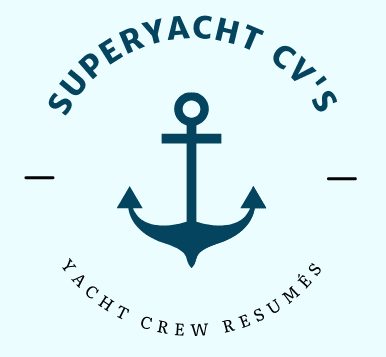
- 0,00€ 0 items
Interview questions you might get asked
As a new yacht crew member, you can expect to be asked a range of questions during the interview process that will help the hiring manager determine if you are a good fit for the position. I want to help prepare you so you can present yourself in the best light.
Take some time to sit down and answer these questions to yourself. You don’t have to have all of the answers, but make sure that you are playing to your strengths and really selling yourself in the interview. Being prepared in an interview can really make all of the difference, not just in how you come across to the captain, but also in how you feel about going into the interview. If you are prepared you will feel confident and you will SHINE!
A few points on setting yourself up for the interview:
Most interviews are done via phone or skype/zoom. They are often with the crew agent first, and then with the Chief Stew, Chief Officer, Chief Engineer, Head Chef or Captain, depending on the position and size of the vessel you are applying for.
- Get yourself in a quiet space. Turn off the music, tv, and keep pets and other distractions out of the room.
- Get comfortable. If that means sitting cross-legged on a couch, do it, if you prefer to sit at a desk, do that. But be as comfortable as you can be while maintaining professionalism.
- Have your own questions written out the for the interviewer. Make sure you cover your own bases on what you want to know about the job, the crew, and the contract.
- Have a glass of water handy. You never know when you need it!
- Don’t be hungover!! Have your wits about you, this is an important interview, treat it as such. I you are tired, hungover or drunk, you will NOT interview well, and you are not suited for yachting long-term.
- Familiarise yourself with the interviewer. Know their name and position if possible, and have a google of the yacht name so you know some of the basics.
- Keep a pen and paper next to you to write notes down.

Some common interview questions for yacht crew members may include:
- Can you tell us about your previous experience in the maritime industry?
- Do you have any specific training or certifications that are relevant to this position?
- How do you handle working long hours and being away from home for extended periods of time?
- Can you describe a time when you had to deal with a difficult situation onboard and how you handled it?
- What are your strengths and weaknesses as a yacht crew member?
- Why are you interested in joining our yacht crew, and what do you hope to gain from the experience?
- Can you explain your approach to providing exceptional customer service to our clients?
- How do you handle working in a team environment, and what do you believe is the key to successful teamwork on a yacht?
- Are you comfortable working in a fast-paced and dynamic environment?
- Do you have any questions for us about the position or our yacht?

30 Yacht Stewardess Interview Questions and Answers
Common Yacht Stewardess interview questions, how to answer them, and example answers from a certified career coach.

Stepping into the world of luxury yachting as a stewardess is no easy task. From maintaining meticulous standards to providing exceptional guest service while living in close quarters, this role demands unparalleled professionalism and dedication. Employers are looking for individuals who can demonstrate these qualities and more, during an interview.
In this article, we delve into some typical yacht stewardess interview questions, providing you with insights on how best to answer them. Whether you’re new to the industry or seeking advancement in your career, our guide will help prepare you for that all-important interview and bring you one step closer to securing your dream job on the high seas.
1. Can you describe your previous experience in the yacht industry?
Experience, as they say, is often the best teacher. Hiring managers for a Yacht Stewardess position want to confirm you have a solid background in the yacht industry, or at least relevant experience that would translate well. The unique challenges and demands of life at sea, coupled with the high standards of service expected on luxury yachts, require a specific skill set and adaptability. Your previous experiences can provide a snapshot of your capabilities and temperament for this unique job.
Example: “I have spent the last three years working on a private luxury yacht, providing high-level service to discerning clients. My responsibilities included maintaining cleanliness, preparing meals and organizing onboard activities.
I was also responsible for managing inventory and ensuring that all guest needs were met promptly. This experience allowed me to develop strong problem-solving skills and an eye for detail.
In addition to this, I’ve completed training courses in silver service and wine knowledge, enhancing my ability to provide exceptional service.”
2. How would you handle a situation where a guest is unsatisfied with your service?
Working on a yacht means providing top-tier service in a confined space, where you’re always on display and there’s nowhere to hide. Given the high expectations and close quarters, there’s a high likelihood of having to deal with dissatisfaction at some point. The question tests your ability to handle criticism, maintain professionalism, and swiftly address issues, all of which are key to delivering excellent customer service and ensuring a harmonious onboard atmosphere.
Example: “In the event of a guest being unsatisfied, I would first ensure to listen attentively to their concerns. Understanding their perspective is crucial in resolving any issue effectively.
After understanding the problem, I’d apologize sincerely for any inconvenience caused and reassure them that we will do our utmost to rectify the situation promptly.
Then, depending on the nature of the complaint, I would take immediate action. This could involve replacing an item, offering a complimentary service or simply providing more attention to detail.
Finally, I would follow-up with the guest to confirm they are now satisfied. This not only shows commitment to resolving their issue but also helps build trust and rapport, which is essential in this line of work.”
3. What are the key elements of maintaining a high standard of cleanliness on a yacht?
The question is posed to measure your understanding of maintaining impeccable cleanliness and order on a yacht. As a stewardess, you’re expected to have a keen eye for detail, and the ability to uphold the highest standards of hygiene and presentation. This is essential in creating an enjoyable and safe environment for guests and crew members alike.
Example: “Maintaining a high standard of cleanliness on a yacht involves regular and thorough cleaning routines. This includes daily tasks such as sweeping, mopping, dusting, and sanitizing surfaces in all areas of the yacht.
Equally important is deep-cleaning at regular intervals to address hard-to-reach areas and prevent build-up of dirt or grime. Using appropriate cleaning products for different materials onboard also ensures longevity and preserves aesthetic appeal.
Moreover, managing waste effectively by separating recyclables, compostables, and disposables is crucial.
Lastly, maintaining personal hygiene among crew members helps avoid cross-contamination. Regular handwashing, use of gloves when necessary, and keeping personal spaces tidy are key practices.
These elements combined ensure a pristine environment conducive to luxury yachting experiences.”
4. How familiar are you with safety procedures on a yacht?
Let’s set sail into the heart of the matter! Safety is paramount in all seafaring roles, including that of a yacht stewardess. When you’re out on the open water, emergencies can’t be handled by a quick call to 911. Interviewers want to ensure you’re already familiar with critical safety procedures, or at the very least, capable of learning them quickly. They want to trust that you can keep your head in a crisis and contribute to the safety and wellbeing of all onboard.
Example: “I am well-versed in yacht safety procedures. This includes knowledge of fire safety protocols, understanding the use of life-saving equipment such as life jackets and rafts, and knowing how to respond to various emergency situations like man overboard or severe weather conditions.
Moreover, I’m familiar with routine safety checks that ensure all equipment is functioning properly. I also understand the importance of regular crew drills to keep everyone sharp on their roles during an emergency.
In terms of health safety, I have basic first aid training and know how to maintain hygiene standards onboard to prevent outbreaks of illnesses.
Overall, my focus is always on creating a safe environment for both guests and crew members.”
5. How would you handle a medical emergency on board?
When you’re out at sea, the stakes are higher and help can be farther away. As a yacht stewardess, you’re not just serving meals and making beds—you’re part of a team that’s responsible for the safety and well-being of everyone on board. Therefore, it’s critical that you can think on your feet and handle high-pressure situations, including medical emergencies. This question helps hiring managers understand your ability to respond effectively and efficiently in a crisis.
Example: “In case of a medical emergency on board, I would first ensure the safety and stability of the patient. This could involve administering first aid or CPR if necessary.
Next, I’d communicate with the captain to inform them about the situation. It’s crucial that they’re aware so they can make decisions regarding adjusting course for medical assistance or contacting coast guard services.
Simultaneously, I’d contact professional medical help via our onboard communication systems. They can provide immediate advice while we arrange for further medical support.
Finally, I will document the incident thoroughly for future reference and insurance purposes. The key is staying calm, acting swiftly, and ensuring clear communication throughout.”
6. What is your approach to dealing with difficult guests or crew members?
Maintaining harmony on a yacht is paramount. As a stewardess, you are not only providing service but also ensuring a positive, enjoyable atmosphere for guests and crew members alike. Dealing with difficult individuals can disrupt this harmony, so a potential employer wants to know how you’d navigate such situations. Your response can indicate your conflict resolution skills, emotional intelligence, and overall suitability for the demanding environment of a yacht.
Example: “In handling difficult guests or crew members, my approach is to remain calm and professional. I believe that understanding their concerns and showing empathy can help defuse tension.
If a guest is unhappy, I would listen attentively to their grievances, validate their feelings, and assure them that we value their comfort and satisfaction above all else. Then I’d work towards finding an immediate solution.
For challenging crew members, open communication is key. If there’s conflict, I’d encourage a private conversation to understand their perspective and find common ground. It’s crucial to maintain harmony onboard for everyone’s wellbeing.
Overall, patience, diplomacy, and excellent interpersonal skills are essential in these situations.”
7. Can you describe a time when you had to handle a stressful situation on board?
Life on a yacht can sometimes be unpredictable, with high-profile guests, potentially rough seas, and high-stakes events. It’s imperative for a stewardess to be able to manage stress effectively and provide exceptional service no matter the situation. Interviewers ask this question to assess your problem-solving skills, your ability to stay calm under pressure, and your commitment to maintaining a high standard of service even in challenging circumstances.
Example: “During a charter, we faced severe weather conditions that caused panic among the guests. I quickly implemented our safety protocol, ensuring all guests had life jackets and were moved to safe areas of the yacht.
In the meantime, I maintained open communication with the captain about the situation. My calm demeanor helped reassure the guests, easing their anxiety.
Despite the stress, I was able to efficiently manage the situation by prioritizing safety and providing clear instructions. This experience taught me the importance of preparedness and effective communication in high-pressure situations.”
8. How do you ensure that you provide a high level of discretion and privacy for guests?
Working as a yacht stewardess means you’ll be in close proximity to high-profile guests, often in their most private moments. It’s essential that you demonstrate an understanding and respect for the boundaries and discretion necessary in this role. The interviewer wants to know that you’re trustworthy and can offer the utmost confidentiality, maintaining the reputation and integrity of the yacht’s service.
Example: “Maintaining discretion and privacy is paramount in the role of a Yacht Stewardess. I ensure this by adhering strictly to confidentiality protocols, not discussing guest information outside my professional duties.
I also practice active listening to understand guests’ requirements for privacy and act accordingly. For instance, if a guest prefers minimal interaction, I respect that by providing service in an unobtrusive manner.
Moreover, I keep personal spaces tidy and undisturbed unless requested otherwise. Any documents or items found during cleaning are treated with utmost confidentiality.
In essence, I believe in treating every guest’s privacy as I would want mine to be respected.”
9. What is your experience with preparing and serving meals on a yacht?
As a yacht stewardess, your role extends beyond just providing excellent service to guests. It also involves understanding the intricacies of preparing and serving meals in a unique environment, such as a yacht. Interviewers want to know if you have the necessary experience and skills to manage these tasks smoothly, ensuring the comfort and satisfaction of guests on board.
Example: “I have extensive experience in preparing and serving meals on a yacht. My culinary skills are diverse, ranging from creating simple yet elegant dishes to crafting multi-course gourmet meals.
Understanding the importance of presentation, I ensure that each dish is visually appealing. I also consider dietary preferences and restrictions when planning menus.
In terms of service, I’m adept at setting up formal dining settings as well as more casual arrangements. I maintain high standards of cleanliness and organization in the kitchen and dining areas.
My goal is always to provide an exceptional dining experience for guests, exceeding their expectations with every meal.”
10. How do you ensure that all areas of the yacht are clean and well-maintained?
Ensuring the yacht is in pristine condition is a pivotal part of a stewardess’s job. They want to know your attention to detail, your ability to multitask, and your dedication to maintaining the high standards expected on a luxury yacht. Your answer can reveal your understanding of the role and your commitment to providing an exceptional experience for the yacht’s guests.
Example: “To ensure all areas of the yacht are clean and well-maintained, I believe in implementing a systematic approach. This involves creating a detailed checklist that covers every area of the yacht, from cabins to engine room. Regular inspections and immediate action on any issues found is crucial.
In terms of cleanliness, using high-quality cleaning products and equipment is essential. Moreover, understanding the unique requirements for different materials used onboard helps prevent damage while ensuring thorough cleaning.
For maintenance, it’s important to have a solid understanding of the yacht’s systems and components. Regular preventative measures can help avoid major issues down the line.
Teamwork also plays a key role as everyone must understand their responsibilities and work together to maintain the yacht’s pristine condition.”
11. How would you handle a situation where a guest has specific dietary requirements?
As a Yacht Stewardess, you wear many hats and one of them is to ensure the comfort and satisfaction of guests onboard. This includes understanding and catering to their unique dietary needs and preferences. The question aims to assess your problem-solving skills, your ability to accommodate diverse needs, and your commitment to providing excellent customer service, even in challenging situations.
Example: “Understanding and accommodating a guest’s dietary requirements is crucial in providing excellent service. I would first ensure to gather this information during the pre-boarding process.
Once I know their needs, I’d liaise with the chef to plan meals that not only meet these requirements but also offer an enjoyable dining experience. In cases where we need specific ingredients, I’d source them ahead of time.
If any changes occur during the trip, I’d communicate promptly with the relevant team members to adjust accordingly. It’s all about proactive planning, clear communication, and flexibility to ensure our guests have a seamless and pleasant stay on board.”
12. Can you describe your experience with managing inventory on a yacht?
The heart of this question lies in understanding your organizational skills, attention to detail, and ability to manage resources efficiently. As a yacht stewardess, your responsibilities include maintaining the yacht’s interior supplies and ensuring everything is well-stocked and organized. This can include anything from food and drink to linens and toiletries. A potential employer wants to know if you can handle this task effectively, as it’s a key part of ensuring a smooth and comfortable experience for guests on board.
Example: “In managing yacht inventory, precision and organization are key. I have experience in maintaining a detailed record of all onboard supplies, from food and beverages to cleaning products and guest amenities.
I regularly conduct audits to ensure we’re well-stocked, taking into account the preferences of both guests and crew. This involves liaising with suppliers, negotiating prices, and coordinating deliveries at various ports.
Moreover, understanding the storage constraints on a yacht is crucial. I’ve developed efficient systems for storing items to maximize space without compromising accessibility.
Overall, my approach combines meticulous attention to detail with proactive planning to ensure smooth operations.”
13. How do you ensure that you are always available to assist guests without being intrusive?
As a yacht stewardess, your primary role is to ensure guests have a fabulous time while maintaining their privacy and personal space. Hence, the interviewer wants to know your tact in managing this delicate balance. They are interested in your ability to provide top-notch service while being discreet, respectful, and understanding of the guests’ needs for privacy. It’s about showing your skills in hospitality, attentiveness, and sensitivity to social cues.
Example: “Understanding the balance between availability and privacy is crucial in a yacht stewardess role. I ensure this by maintaining a keen sense of observation to pick up on guests’ cues, such as body language or tone of voice, which can indicate their need for assistance or desire for solitude.
I also maintain regular but discreet check-ins, ensuring that everything is satisfactory without being overly present. A simple glance from afar can often tell if a guest needs something.
Furthermore, clear communication at the start about preferred methods and times of contact helps set boundaries. This way, I can provide high-quality service while respecting personal space.”
14. How would you handle a situation where a guest is seasick?
Being a yacht stewardess is not just about serving food and drinks with a smile. It also involves ensuring the comfort and safety of all guests. This includes being able to handle unexpected situations like a guest experiencing seasickness. The interviewer wants to know how you would approach this situation, demonstrating your problem-solving skills, empathy, and ability to react calmly under pressure.
Example: “In such a situation, I would first ensure the guest is comfortable and safe. I’d offer remedies like ginger candies or wristbands that can help alleviate seasickness symptoms.
If these options are not effective, we have over-the-counter medications onboard which can be offered after consulting with the captain.
Throughout this process, it’s crucial to maintain open communication with the guest, ensuring they feel cared for and reassured. In severe cases, we may need to alter course or speed to provide smoother sailing conditions.”
15. What is your approach to dealing with unexpected changes in schedules or plans?
As a yacht stewardess, you’ll be operating in an environment where the unexpected is the norm. Whether it’s sudden changes in weather, last-minute guest requests, or unexpected maintenance issues, the ability to adapt quickly and handle these situations with grace and efficiency is key. Therefore, the interviewer wants to see if you have the flexibility and problem-solving skills necessary to thrive in this unpredictable work environment.
Example: “In the yachting industry, unexpected changes are quite common due to weather conditions or guest preferences. My approach is to remain flexible and proactive. I always have a backup plan ready for different scenarios.
When plans change, I quickly assess the situation, consider alternatives, and implement the most suitable solution without compromising service quality. It’s also crucial to keep clear communication with the team during such times to ensure smooth operations.
Staying calm under pressure helps me adapt efficiently. Every unexpected change is an opportunity to showcase problem-solving skills and deliver exceptional service despite challenges.”

16. How familiar are you with different types of luxury table settings and service styles?
The essence of a yacht stewardess role is all about providing a luxury experience for the guests onboard. This includes, but is not limited to, impeccable table service and presentation. A potential employer would want you to demonstrate your knowledge in this area to ensure you can deliver the high level of service expected in such a luxurious environment.
Example: “I am well-versed in various luxury table settings and service styles. I have experience with formal, informal, buffet, family-style, and Russian service settings. Each requires a different approach to setting the table and serving guests.
In formal settings, precision is key; every utensil, glass, and plate has its place. Informal settings are less rigid but still require attention to detail. Buffet style needs strategic placement for easy access while maintaining an appealing layout. Family-style encourages interaction, so it’s about creating a warm, inviting space. Russian service is all about grandeur and impressing guests, requiring impeccable timing and coordination.
Understanding these differences enables me to adapt quickly and provide excellent service regardless of the situation or guest preferences.”
17. Can you describe a time when you had to resolve a conflict between guests or crew members?
As a yacht stewardess, you’re the face of hospitality on board, and harmony among guests and crew is paramount to ensuring a pleasant experience. Conflict resolution skills are key in this role, as you may often find yourself in the middle of disagreements or misunderstandings. Demonstrating your ability to handle these situations with grace, respect, and patience shows potential employers that you’re equipped to maintain a positive environment on board.
Example: “During a charter, two guests had a disagreement over itinerary plans. One wanted to visit a popular tourist spot while the other preferred a secluded beach. I approached each guest individually to understand their preferences and concerns.
Afterwards, I proposed a solution that accommodated both desires: we would spend half of the day at the tourist spot and the rest on the secluded beach. Both guests agreed to this compromise.
In another instance, two crew members disagreed about cleaning responsibilities. I facilitated a conversation between them where they could express their views openly. We then redefined their roles clearly to prevent future misunderstandings.”
18. How would you handle a situation where a guest has brought a pet on board?
This query is designed for the employer to gauge your flexibility and problem-solving skills. As a yacht stewardess, you’ll often be faced with unexpected situations, such as a guest bringing a pet on board. Your ability to handle such surprises with grace, adaptability, and a customer-oriented approach will be critical to your success in this role.
Example: “In handling a situation where a guest has brought a pet on board, I would first ensure the safety and comfort of all parties involved. It’s crucial to clarify if pets are allowed according to yacht policy or specific charter agreements.
If pets are permitted, I’d make sure that the animal is well-cared for during their stay, ensuring cleanliness and orderliness. If not, I would politely inform the guest about our policy while offering alternative solutions such as arranging for pet care services ashore.
Maintaining open communication with guests regarding their needs and expectations is essential in these situations. This approach ensures we provide excellent service while adhering to company policies and maintaining the welfare of all guests on board.”
19. How do you ensure that you maintain a professional appearance and demeanor at all times?
Polished professionalism is at the core of a Yacht Stewardess’ role, given the high-end clientele and the need to represent the yacht’s brand positively. By asking this question, hiring managers can gauge your understanding of and commitment to maintaining high standards of personal grooming and professional conduct, regardless of the situation at hand.
Example: “Maintaining a professional appearance and demeanor is crucial in the role of a Yacht Stewardess. I do this by ensuring my uniform is always clean, well-fitted, and ironed. Personal grooming such as neat hair, minimal makeup, and good hygiene are also priorities.
In terms of demeanor, it’s about being respectful, polite, and attentive to guests’ needs at all times. I maintain composure under pressure and handle any issues with grace and discretion. Regular self-reflection helps me identify areas for improvement.
I believe that professionalism isn’t just an act but a lifestyle. It reflects in every interaction, whether with guests or team members. This mindset has helped me excel in providing top-notch service throughout my career.”
20. What is your experience with planning and executing events or parties on a yacht?
A significant part of a yacht stewardess’ role is to ensure that guests have an exceptional experience, which often includes organizing and executing events. Hiring managers want to ensure that you have the organizational skills, attention to detail, and creativity required to plan and execute these events to a high standard. Your ability to handle logistics, cater to guest preferences, and create memorable experiences is critical in this role.
Example: “I have extensive experience in planning and executing events on yachts. My approach involves understanding the client’s vision, then meticulously organizing every detail from food and beverage to entertainment.
My expertise lies in creating a seamless flow for the event while ensuring all safety procedures are adhered to. I’ve successfully managed diverse events such as corporate gatherings, private parties, and themed celebrations.
One of my key strengths is problem-solving under pressure which guarantees smooth operations even when unexpected situations arise. Also, I am adept at maintaining an exceptional level of service throughout the event.
In short, my experience and skills ensure memorable yacht events that exceed clients’ expectations.”
21. How do you handle the physical demands of the job, such as lifting heavy items or working long hours?
Life on a yacht is not all sunshine and sea breezes. Stewardesses are often tasked with heavy lifting, long hours, and tasks that require physical stamina. Employers want to ensure that you’re physically capable of handling the demands of the job, and that you have strategies in place to maintain your health and energy levels.
Example: “Maintaining physical fitness is essential for the demanding tasks of a Yacht Stewardess. I engage in regular workouts, focusing on strength and endurance to ensure I can handle heavy lifting or prolonged standing.
I also understand the importance of rest and proper nutrition. This helps me maintain my energy levels during long hours.
To manage workload effectively, I prioritize tasks and take short breaks when possible. It’s all about balance and understanding your limits while still delivering exceptional service.”
22. Can you describe a time when you had to use your problem-solving skills on board?
Navigating the seas is never without its surprises, and in the luxury yachting industry, delivering a flawless experience is paramount. This question aims to ascertain your ability to think on your feet, troubleshoot unexpected problems, and maintain the highest level of service, even under pressure or in challenging circumstances. Your ability to solve problems directly impacts the satisfaction of guests and the smooth running of the yacht.
Example: “During a charter, we encountered an unexpected storm. The guests were nervous and uncomfortable. I quickly assessed the situation and decided to distract them with an impromptu indoor entertainment program.
I coordinated with the chef for some comfort food while setting up board games and movies in the main salon. This not only diverted their attention but also helped create a cozy atmosphere. It was a challenging situation that required quick thinking and problem-solving skills to ensure guest satisfaction despite unfavorable circumstances.”
23. How do you ensure that all guest accommodations are prepared and ready for their arrival?
Maintaining a high standard of customer service is essential in a luxury industry like yachting. This question helps employers gauge your attention to detail, your ability to foresee guest needs, and your commitment to creating a welcoming and comfortable environment. It’s all about ensuring the guests’ experience on the yacht is nothing short of exceptional from the moment they step onboard.
Example: “To ensure all guest accommodations are prepared, I first create a checklist of tasks to be completed before arrival. This includes cleaning and sanitizing the rooms, stocking amenities, and setting up personalized touches based on guest preferences.
I then delegate these tasks to my team, ensuring everyone understands their responsibilities. Regular inspections are conducted to maintain high standards.
Communication is key in this process. Any changes or special requests from guests are promptly addressed. By being proactive and detail-oriented, we can guarantee a seamless experience for our guests.”
24. What is your approach to dealing with jet-lagged guests or those from different time zones?
As a yacht stewardess, you’re expected to provide top-tier service to guests from all around the globe, who may be dealing with jet lag or adjusting to different time zones. This question helps assess your understanding of the unique challenges these guests might face and your ability to adapt your service to accommodate their needs, ultimately ensuring their comfort and satisfaction.
Example: “Understanding the needs of guests from different time zones is crucial. I would ensure that their rooms are prepared for rest upon arrival, with blackout curtains and a quiet environment to aid sleep.
For jet-lagged guests, providing them with light meals rich in protein can help reset their internal clocks. Offering beverages like chamomile tea or warm milk can also promote relaxation and sleep.
I’d be flexible with service times, adjusting meal and activity schedules to suit their body clock rather than local time.
Lastly, promoting gentle physical activities such as swimming or walking on deck can help adjust their circadian rhythm faster. It’s all about personalizing services to meet individual needs.”
25. Can you describe a time when you had to handle a maintenance issue on board?
In the dynamic environment of a yacht, unforeseen issues can arise at any time. The interviewer wants to know if you can handle situations where you might have to step outside your typical duties and problem-solve on the fly. They’re interested in your ability to respond to unexpected challenges, keep a cool head, and ensure the safety and comfort of passengers and crew alike.
Example: “During a charter trip, we experienced an unexpected power outage. I quickly assessed the situation and found that one of our generators had failed.
I immediately informed the captain and contacted our on-call engineer. While waiting for instructions, I ensured all guests were safe and comfortable, using emergency lighting and providing reassurances.
The issue was resolved swiftly under my coordination with minimal disruption to our guests’ experience. This incident highlighted the importance of quick thinking, effective communication, and maintaining guest satisfaction during unforeseen circumstances.”
26. How do you ensure that all safety equipment is in good working order?
Safety is paramount in the yachting industry. As a yacht stewardess, you are not only responsible for providing top-notch hospitality but also for ensuring the safety of the guests on board. Your ability to maintain and check the safety equipment can be a matter of life or death in emergency situations. Hence, your potential employer wants to know how you handle this critical aspect of the job.
Example: “Regular inspections and maintenance are key to ensuring safety equipment is in good working order. I would create a checklist of all the equipment on board, including life jackets, fire extinguishers, and first aid kits.
Each item would be checked for any visible damage or wear and tear. Expiry dates would also be monitored closely, particularly for items like flares.
For more complex equipment, such as firefighting systems or life rafts, professional servicing may be required. Keeping track of service schedules and arranging timely checks is crucial.
In case of any faults or issues, immediate action would be taken either through repair or replacement. Regular training sessions would also ensure that everyone on board knows how to use the equipment properly.”
27. Can you describe your experience with handling luxury items and valuables on board?
Being a yacht stewardess involves a lot of responsibility, including handling high-end, luxury items and valuables. Owners and guests often have expensive tastes and will bring valuable items on board. Consequently, they want to ensure that their possessions are in safe, capable hands. This question helps identify whether you have the necessary experience and skills to handle such items with the utmost care and professionalism.
Example: “In my experience, handling luxury items and valuables requires a high level of care, discretion, and responsibility. I’ve been entrusted with the upkeep of expensive artwork, antiques, and personal belongings.
I always ensure to use the appropriate cleaning materials and techniques to avoid damaging these precious items. For example, for delicate fabrics or surfaces, I use gentle, non-abrasive cleaners.
Moreover, I understand that privacy is paramount for guests. Therefore, when dealing with personal items, I make sure to respect their space and handle their possessions with utmost respect.
Maintaining an inventory system has also proven effective in managing valuables. This way, we can account for every item and prevent any losses.
Overall, I believe meticulous attention to detail and respect for the owner’s property are key when dealing with luxury items on board.”
28. How do you handle a situation where a guest is not following safety procedures?
Life at sea can be unpredictable, and safety is paramount on any yacht. As a stewardess, you’ll be interacting with guests on a regular basis and it’s your responsibility to ensure they adhere to safety guidelines. Interviewers want to know that you will handle such situations with diplomacy and tact while ensuring rules are followed, as failure to do so could potentially lead to dangerous situations.
Example: “In such a situation, I would approach the guest calmly and politely remind them of the safety procedures. It’s essential to explain why these rules are in place, emphasizing their importance for everyone’s safety on board.
If they continue disregarding the procedures, I would escalate the matter to my supervisor or the captain. They can decide whether further action is necessary. My goal is always ensuring all guests enjoy their time on the yacht while maintaining a safe environment.”
29. What is your approach to maintaining a positive and professional relationship with the yacht crew?
Effective crew dynamics are the lifeblood of a smoothly operating yacht. As a stewardess, you will be living and working in close quarters with the rest of the crew. Therefore, it’s important that you have the ability to form professional relationships and maintain a positive atmosphere. Interviewers want to ensure that you can contribute to a harmonious working environment and won’t cause conflict or disruptions.
Example: “Maintaining a positive and professional relationship with the yacht crew is crucial. It starts with respect for everyone’s roles, acknowledging that each contributes to the smooth operation of the yacht.
Open communication is key. I would ensure any issues or concerns are addressed promptly and professionally.
I also believe in fostering a team spirit. Participating in team activities can help build camaraderie and mutual understanding.
Lastly, maintaining professionalism at all times is important. This includes adhering to work schedules, respecting privacy, and demonstrating a consistent work ethic.”
30. Can you describe a time when you went above and beyond to provide exceptional service to a guest?
The luxury yachting industry is highly competitive, and the expectation for unparalleled guest service is standard. As a yacht stewardess, you’re on the front lines of hospitality and often the first point of contact for guests. Interviewers ask this question to gauge your understanding of what exceptional service means in this unique context, and to assess your creativity, resourcefulness, and dedication in exceeding guest expectations.
Example: “During a charter trip, we had a guest who was celebrating his birthday. I noticed he seemed particularly fond of a certain vintage wine that wasn’t available on board. On our next port stop, I took the initiative to source this specific wine from local vendors.
Despite it being challenging due to its rarity, I managed to find and purchase it. The guest was pleasantly surprised and extremely appreciative of the effort. This experience taught me that going the extra mile can significantly enhance guests’ satisfaction and overall experience.”
30 Shipping And Receiving Coordinator Interview Questions and Answers
30 electronic assembler interview questions and answers, you may also be interested in..., 30 head lifeguard interview questions and answers, 20 common population health manager interview questions and answers, 30 project manager officer interview questions and answers, 30 public defender interview questions and answers.
FAQs for yacht crew jobs

Superyacht jobs are both interesting and intriguing to new yachties hoping to enter the industry. However, without friends and contacts in the industry there's often a lot left to question. Yachting Pages has answered a list of frequently asked questions below, and provides some handy resources for those seeking more information!

Is there a minimum age to work on yachts?
The minimum age to work aboard a yacht or superyacht is 16 years. However, people under the age of 18 years cannot work throughout the night. This means a period of at least nine hours, starting before midnight and ending before 5am. This is set out with MLC 2006 regulation (section A1.1). Some crew agents (marine recruitment specialists) and captains may therefore not place workers until they reach at least 18 years of age.
Can I find a yacht job working with my partner?
There are scenarios where couples and partners have found work on board superyachts together. However, this is typically an opportunity for those crew at a more senior level, and such positions aren't common in the industry. As an entry-level worker, it's unlikely that this will be permitted. However, relationships can and do often develop on board between crewmembers. In these cases it's recommended that captains are kept informed as soon as possible.
Do I need to speak languages to work in the yachting industry?
Not necessarily. English is the favoured language of the seas, but those with language skills may find they have a competitive edge over other yacht crew when searching for work. English is the language typically spoken on board many yachts, regardless of where they are based. However, language skills are valuable, and will help yachties in dealing with superyacht owners, charter guests and marine suppliers around the world.
How do I find a yacht job?
The process of searching for a yacht job is similar to searching for work on land in many ways. Once you have the relevant training and visas in place, you can register with a marine recruitment agent on or offline; you can search social media and forums for available jobs; you can walk the docks of the world’s yachting hubs; or you can choose to network in popular yachting hangouts.
Find out how to find a yacht job , or sign on with a yacht crew agent.

When and where in the world can I find a yacht job?
Many looking for work in the superyacht industry decide to up and move to the sea as soon as possible. It's a full-time job in itself looking for that first yacht job, so this is recommended. When looking for work, you may find that you start out by undertaking day work or filling temporary positions for cash and experience before you get lucky and start in a permanent position. It's recommended that yachties move to well-known yachting ‘hiring ports’ in line with the peak seasons to find work.
Discover crew hiring ports and find out where to be and when to find a yacht job.
Find local yachting hubs and crew hangouts around the world.
What crew training qualifications do I need?
In order to get started as crew on board a yacht or superyacht, it's mandatory for crew in all departments to pass the STCW10 and ENG1 qualifications for safety on board. There are however plenty of other crew qualifications and related skills that will help you to get further in your career in the yachting industry.
Find crew-training providers in your location.
Learn more about crew training and qualifications, and the required skills for positions on board.
Do I need to apply and/or pay for crew documents and visas?
There are some crew documents that crew must apply and pay for, however the yacht owner will likely pay for most of your legal documents as you join and travel aboard the yacht. Once you have secured a job, MLC 2006 regulation (section A1.4) states that the seafarer should not contribute towards documents and visas, apart from a national statutory medical certificate (such as an ENG1), and a seafarer’s book and passport.
Learn about ENG1 Crew Medical Certificates.
What will my salary be as a yacht crewmember?
As with many jobs, crew salaries can vary greatly across the industry depending on a number of factors, such as the level of skill and experience, the position taken on board, and the size and type of yacht.
Find out more about yacht crew roles and their expected salaries on board.
What will my working hours be on board a superyacht?
There is simply no typical day on board a superyacht. Your working hours are subject to change, and will fluctuate with the seasons, guests and maintenance required. In the high season, you will work long hours and go long periods without a day off. In the low season you may get evenings and weekends off. Your captain or yacht management company will set out your working contract on board once you accept your yacht job - this will include information about your working hours, holiday allowance and expectations.
Find out more about yacht crew contracts and responsibilities on board.

What skills are useful for my superyacht CV?
Although you may not have worked on superyachts before, you may find that you actually have lots of relevant experience to bring to the table, depending on the department you choose to seek work in. Stews and stewardesses will need bartending, catering, cleaning and hospitality skills; deck crew a background of boats and water sports; and officers experience of team and project management. It’s simply about relating your skills and experience to the job you’re applying for on board.
Discover tips for writing your yacht crew CV.
What should I expect in a yacht job interview?
Interviewing for a yacht job follows many of the same principals of shoreside interviewing. You should go equipped to answer questions about why you want to work on a yacht, what you could bring to the yacht and be ready to work. You should also have lots of questions for the captain about how he/she likes things done on board, and look the part.
Find out how to succeed in yacht job interviews.
What should I take with me?
Always travel light! As an entry-level crewmember you will not have much personal space, sharing cramped cabins with one other. You will be given all your crew uniform and clothing, as well as toiletries on board, so you will only need civilian clothes for your free time, and perhaps a tablet, kindle, journal and/or small personal effects and home comforts. Luckily you are likely to travel through some of the world’s most desirable and affluent places, so bits can be picked up along the way.
What’s after yachting?
The yachting industry is large and varied, and offers many transferrable skills for life after yachting. You could find shore-based work in the industry, perhaps as a florist or charter broker, or you could transfer back to land to take up a completely unrelated position. You’ll have travelled the world and earned some great team and project management skills along the way.
Still interested in a job on board? Read on for tips to make your crew CV stand out , or learn about the crew interview process.
Tried & Tested

A jacket completes any crew member's uniform so it's an important garment to get right. In this Tried & Tested, Sea Design pits eight popular jackets against one another to determine which one is best for superyacht crew in 2023.
iAQUA creates high-performance, technologically advanced underwater scooters. In this Tried & Tested, a team of experienced testers have rated and reviewed the AquaDart Pro and AquaDart Nano series to reveal the stand-out iAQUA sea scooter.
In our 2022 Tried & Tested, yacht toy specialist EAMS and a group of captains and crew review a selection of the very best luxury water toys on the market. Find out which toy was crowned the winner...
SeaYou will be returning to Marina Genova for its 4th edition on Thursday 18th April and Friday 19th April, 2024....

MB92 Group and Pinmar, part of GYG Ltd, has partnered to launch a sustainability initiative in collaboration with the Ba...

Popular Articles
Finished reading now find your perfect supplier..
Search our industry-leading directory for over 20,000 superyacht suppliers, providers and marinas.
How to ACE your Interview – Part Two
by theyachtstew
Today’s post is a follow-up on the popular topic of Interviews. In part 1, three amazing Chief Stewardesses shared their top 3 tips for Stewardesses while doing an interview. Click HERE if you haven’t had a chance to read it yet!
To continue the conversation of putting your best foot forward for your next interview, I asked 4 Chief Stew’s to share what they feel are appropriate & inappropriate questions to ask the employer.
Personally, I ALWAYS ask about the longevity of the crew and what sort of actives the crew do together when not working. These two points are so important to me, I need to know that the boat treats the crew well enough that crew stay onboard longterm & that the crew does more that just drink on weekends.
The three brilliant minds behind part 1 of this series are back AND we added another BRILLIANT Chief Stewardess, Harriet!
Harriet ~ Chief Stewardess of 1 Year
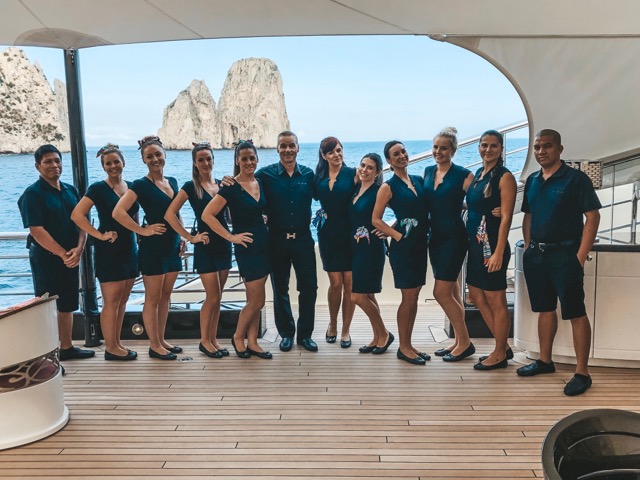
What would you consider to be appropriate questions from the Stew?
1) Find out about crew dynamics and longevity
2) What does the role involve? Progression onboard?
3) What’s the interior structure & the structure of hierarchy onboard?
What would you consider to be inappropriate questions from the Stew?
One of the first or only questions being money related, then you know that they are only in it for the money.
Cantleigh ~ Chief Stewardess of 1 Year
1) How is the position become available? ie What is the crew turn over like? If you feel this is too direct One could ask, what is the longest/ average time of the crew.
2) What are the crew dynamics like? Is the crew active? Do you do crew activities off the boat? Is Crew morale encouraged in down time?
3) What is the package! For me many girls seem to only ask about salary and forget there is so much more to take into consideration. Is there flights, is the FULL medical aid on AND OFF the boat. Some boats do a rewards scheme such as 13th month bonus or courses paid for after a year onboard. Some boats may be 100 euro off another but invest in the longevity of their crew and for me this is worth so much more!
4) Can you share with me a bit about your career. This is a polite way to see the experience the chief will have and bring to your growth and development.
All of which I have regretfully been asked
1) Is there a drug test, if so how often (RED FLAG)
2) Is this a dry boat? Is alcohol brought for the crew because I the boat my friend joined does.
3) Who are the owners, what do they do? this is privileged and private information for the crew. Rather ask what are the nationalities. Is it formal silver service etc to get a feel.
4) Do we get weekends off? This for me indicates someone not willing to give me all they got
1) Itinerary
1) Asking too much about the guests, (me personally I would never do it)
2) Also asking for time off, free weekends etc…(Its important to know, but for me it would be a sign you are looking for chill boat with little work.)
Meg ~ Chief Stewardess of 2 Years
First of all, I think it is SO important for a candidate to have some questions ready. I hate nothing more than when we get to the end of an interview and I ask if there is anything the candidate would like to go through or any questions they have, and they say nothing. For me, this could suggest a lack of interest or, if recruiting for a more senior role, a lack of experience. When a boat is interviewing you, they are trying to get to know you. We use interviews not only to see your experience but also as a way of gauging crew fit, department fit, social skills and overall personality. However, as a candidate (junior or senior), during this interview, you are simultaneously interviewing the boat to see what vibe and professional feel you get for the chief stew, captain, management etc.
1. Do you offer onboard training? Does the boat offer any sort of opportunity for shore side training? Is this paid for by the boat? Can I use this opportunity within the first 6 months/1 year of joining?
These sorts of questions scream commitment to the industry, as it immediately shows me that you are interested in learning, which is something I truly feel the candidates coming through the interior departments are lacking.
2. Ask about crew turnover or longevity. Most importantly within the interior department. Why is the position available? It may be because the previous junior stew was bumped up a rank, which shows the boat is open to promoting from within, which is great. If it was because she had a falling out with the Captain, or she felt she was not learning anymore, this could also suggest a few things.
3. Ask about your crew accommodation. Who will you be sharing with? Will you have to move cabins often to accommodate rotational positions? Will you be sharing with females only? I find one of my most important questions to ask a junior stew is about their previous living space. I prefer to stay clear of a candidate who has never lived away from home or who has never shared a dormitory etc. Crew cabins can be small spaces and you will almost always share a cabin.
I know several people suggest any questions about salary or leave are inappropriate, but I would suggest that it is the way in which they are asked that can be inappropriate. It is important that you find out about the contractual offering (salary, leave allowance and what medical cover you are entitled to as a crew member), however if these questions are the first thing you ask about, it could suggest that you are more interested in the money side of the job rather than the opportunity to learn and enter into the industry.
Personally, I do not like it when candidates try to ask several questions about itinerary. I always explain our basic movements for the upcoming year (med season locations, shipyard etc), but I find candidates often push for more info on this. I understand that exciting itineraries are sought after, but when you are looking of your first job, itinerary should not be as important as a solid captain and crew and a motivational environment to work in.
I really hope this has been insightful & helpful to all you! Interviews are SO important and vital to a successful career!
I have a few more Interview Posts coming & this time it’s for Chief Stews & HOW to interview!
- Latest Posts
- Managing TWO full time jobs, while changing the world - October 16, 2020
- Mini Series: Dealing with being overwhelmed // Yoga - October 9, 2020
- Mini Series: Dealing with being overwhelmed //Breathing - October 8, 2020
Get inspired! Pop your email in to get our cocktail recipe cards!
Download and print off our recipe cards and take them with you to all of your boats, so next time a guest asks for a cocktail and says “Surprise me”, you’ll have some delicious go-to recipes. By signing up, you’ll also get our weekly “Happy Hour” email with a different cocktail recipe each week, helpful stew tips and the latest exciting updates from The Yacht Stew.
Sign Me Up!
We promise not to spam you! You can unsubscribe at any time.
Related Posts:

The Importance of Pap Smears
Today's blog post is a little different and for a good reason! At the beginning of the year (2020), one of my...

Online Wine Courses
Online Courses Whether you are for them or against them, online courses seem to be the hot topic right now...

RECRUITMENT AGENT
After 8 adventurous years of working on yachts, Taryn decided to return to life on land. She currently lives on the coast of sunny South Africa. Fresh off the yachts and having worked in high-end resorts and hotels, Taryn has a broad knowledge of what the industry needs and is well-qualified to find the perfect match for both crew and the yacht. Taryn’s friendly, kind demeanour and passion for the industry ensure to provide excellent and professional communication with clients and crew at all times. When Taryn is not working you can find her on the beach, participating in any form of outdoor activity or sharing a bottle of wine with family and friends.

Ciara joins our team with 5 years of experience in the industry and is based in Bristol, UK. She brings her people skills and passion for luxury customer service into recruitment whilst maintaining a calm and kind nature for both crew and clients. When not working, Ciara continues studying music history and classical music performance and enjoys walks in the countryside with her husband and sausage dog.

Mandy has 8 years of experience in the industry and brings her A-game from the South of France. She brings a unique and energizing perspective with 5 years of land-based recruitment experience in London and is sure to make anyone feel welcome with her kind-hearted nature. When she’s not working, she can be found spending time with her husband and daughter, enjoying the beauty of France.

Eloise brings 3 years of experience in the industry to our team. Currently living in South Africa, Eloise was the first member of the TYSR team and has since built lasting relationships with clients and crew. Eloise splits her time between South Africa and TYS HQ in the UK. She is incredibly caring and ensures all crew and clients get the best possible support, with high standard of customer service. When not working, Eloise spends time with friends and family enjoying wine farms and safaris in sunny South Africa.

Gemma Hulbert
FOUNDER AND CEO
Gemma founded The Yacht Stew in 2016 and has over a decade of experience in the industry. When she founded TYS she wanted to create a community for people in the industry and create an incredible support network that was both informative and nurturing. She brings her keen eye for detail, and her incredibly compassionate perspective to anything she does, and is sure to get anyone inspired. In her spare time Gemma loves to be with family and friends, or out exploring and traveling with her husband.

Thank you for subscribing! Please check your email for a confirmation link!
- Brokerage New Construction How to Buy How to Sell
- Yacht Fleet Yacht Catalog Charter Marketing Destination Guides
- Financial Services Payroll & Accounting Payroll Service Process Logistical Support Admin Services Crew Admin
- Job Descriptions Crew FAQ
- About Sitemap
- Yachting Industry
What is the yachting industry?
Yachts range in size from 50-450 ft. For the most part they are owned by individuals who vacation onboard. Yachts that are used uniquely by the owner, his family and friends are referred to as private. If an owner leases his yacht to a third party the yacht is considered a charter yacht. Both private and charter yachts in all size ranges require crew to maintain and run the vessel. The itinerary (where the vessel travels) is determined by the owner. Standards of service, while usually very high, vary from yacht to yacht. For the most part, yachting is an industry that brings together like minded people as crew who are prepared to work hard. Yachting is unlike any other industry and, as such, the rewards and expectations are unique.
How do I get started in the yachting industry?
First of all you are in the right place. Luxury Yacht Group is regarded as the industry leader for the proper placement of crew and we receive job orders from employers on a daily basis. To get started in the yachting industry there are a couple of key steps. Firstly, research and understand the industry by reading the following frequently asked questions and familiarizing yourself with the rest of our website. Secondly, complete your online LYG registration. Finally, we encourage all crew to obtain their Basic STCW 95.
Do yachts hire people with no experience in yachting?
Absolutely! The most common entry-level positions which offer new crew the ability to learn the “ropes” of yachting are:
Depending on your previous work background, you may fit very well into a role as yacht crew. Although there are no solid “requirements” for some entry level positions, each Captain will put forth a list of his/her specific “preferences” in a candidate. Should your background be consistent with what the owner or Captain may be looking for, you should be prepared to undertake any variety of duties that would include:
- Cabin preparation
- Detailing the interior of the vessel
- Food service
- Drink service
- Detailing exterior
- Line handling
What skills do I have that would be useful on a yacht?
For new to industry crew, there are many ways to make yourself more appealing to yacht owners and Captains. Emphasize your present skills and experience and focus on what characteristics you have may be applicable to the job you desire. There are a variety of skills that can help give you an edge, such as:
- Nanny / Babysitting / Au Pair
- Formal service training / Silver Service / White Glove
- Carpentry / Woodworking
- Diving / Water sports
- Experience in a Hotel, Resort, Cruise Ship, Restaurant or Estate
- CPR, First Aid certification or any emergency medical training
- Masseuse / Esthetician license
What if I get seasick?
You can expect to have to work regardless.
Do I need a visa to work on a boat that cruises US waters?
Many foreign flagged yachts will only hire non-American crew if they hold a B1/B2 visa for the United States. A C1-D visa is not appropriate for private yacht crew. If you do not have a B1/B2 visa a Captain may be willing to hire you on the condition that you are prepared to obtain the visa, then you can apply for the visa using boat documents. Please visit our resources section for more visa information.
What is STCW 95?
The STCW training classes include the following elements:
Personal Survival Techniques
- Fire Prevention and Fire Fighting
- Elementary First Aid
- Personal Safety and Social Responsibility
- Competence in Security Awareness
Elementary First-Aid Training
One day First Aid and CPR which is instructed in compliance with STCW Code A-VI/1-3 and consists of approximately seven hours of theory and practical covering basic First Aid and CPR in marine situations. The course is followed by a written exam.
Basic Fire Prevention and Fire Fighting
Two day fire prevention and fire fighting module which is instructed in compliance with STCW Code A – VI/1-2 including shipboard fire fighting organization, the elements of fire and explosion, types of ignition, fire and smoke detection, breathing apparatus use and automatic alarm system familiarization. Trainees will fight and extinguish actual fires using personal equipment, practical instruction taught by licensed and certified fire fighting professionals.
Proficiency in Maritime Security Awareness
A half day module which is instructed in compliance with STCW Reg V1/6 and Part A of Section A-VI/6 paragraph 4 and consists of a half day in the classroom covering subjects such as maritime security key threats, recognition and awareness of threats, plans and procedures for combatting threats, drills, communications and reporting.
This module is required from January 1, 2014 as a part of the update to the STCW Code mandated by the 2010 Manila Amendments, by all personnel employed or engaged on-board ships to which the ISPS Code applies.
One and a half day personal survival course module, also known as Basic Sea Survival, which is instructed in compliance to STCW Code A – VI/1-1 and consists of a day in the classroom covering subjects such as emergency situations, evacuation, survival craft and rescue boats, personal lifesaving appliances, survival at sea, emergency radio equipment and helicopter assistance. The theory part is followed by a written exam. The remainder of the course is spent in a swimming pool performing the simulation of abandon ship procedures. The practical exercises are subject to ongoing assessment by the instructor.
Personal Safety and Social Responsibilities
This is a one day course which is instructed to STCW Code A – VI/1-4 as revised by the 2010 Manila Amendment. The course covers working relationships on board, health and hygiene, drugs and alcohol, shipboard management structure and responsibilities, emergencies and safe working practices, with enhanced coverage of communications, control of fatigue, teamwork and marine environmental awareness issues. The course is followed by a written exam.
- Registration
How does the LYG system work?
Luxury Yacht Group introduces employers to crew through a balance of technology and personal contact. Our website is database driven, so it is in your best interest to keep your online registration updated. In addition, our crew coordinators have the capacity to introduce you to many employers so approach all interaction with a high level of decorum.
To get the most from our system:
- Login to our site on a regular basis and check your My Jobs page. Our database will alert you to open jobs for which you may be an appropriate candidate.
- For each of these jobs either confirm or decline your interest. If you confirm interest our crew coordinators and the employer will be able to view your details and you are then a potential candidate for the position.
- Most importantly, we request crew to change their availability status to unavailable when they are no longer looking for work.
- If you find work remember to update your availability and experience.
- If you complete a course update your certifications.
- If you update your resume make sure to upload the latest version.
By keeping your online file current you are helping our crew coordinators to find you your dream job.
What is the first step after I register?
Once you are registered and your file is adequately complete the system will indicate to you that you can submit your file for consideration. Once you have submitted your file our team of crew coordinators will review your file and begin the reference verification process.
- Finding Work
What positions are available on luxury yachts?
Depending on the size of the yacht, you will find a variety of positions. See our job descriptions page for more details.
Can yachting be a career?
Of course, and many yachtsmen have dedicated themselves to the industry and established successful careers. LYG is committed to helping you make yachting a career. Once you are placed and gaining experience please stay in contact with your crew coordinator. Our web site is a great tool to providing extensive information on licensing and training and you may track your experience and longevity in relation to salary and certifications.
How long will it take to find a job?
This is not an easy question to answer. Yachts are always looking for crew and in many instances it is about being in the right place at the right time. There are many factors that contribute to your "place-ability" and consequently the time it will take to find a job. The best thing to do is to be well presented on paper and in person. Stay in touch with your crew coordinator and check your My Jobs page frequently.
How do I make my interviews successful?
First impressions are paramount, it is important to make a terrific, lasting impression.
- Make sure to arrive on time, dress in professional yachting attire and be immaculately presented.
- Bring copies of your resume, licenses and references.
- Please don't chew gum, smell of cigarettes or wear excessive jewelry.
- Turn off your cell phone and try to keep your tattoos hidden.
- Greet your interviewer with a firm handshake and make eye contact.
- Speak with confidence and be honest about your experience and ability.
- Be clear about your career objectives and how they apply to your career path.
- Stress positives, avoid negatives.
- Keep your questions focused on the job and its requirements - not the benefits.
What can I do to increase my chances of finding the right job?
Return job related phone calls and emails promptly. While you are waiting for an employer to contact you we suggest that you enroll in additional courses to increase your suitability for your dream job. Maritime Training Schools offer entry level courses for interior and deck departments in the following areas:
- Professional Etiquette and Social Skills
- International Table Service (French, Russian, etc.)
- Interior and Exterior Detailing
- Bartending and drink service
- Wine courses
- Flower arranging
- Massage Therapy
- Boat handling and general boat operations
Please visit our resource section for list of schools in your area.
Is there a right time of year to find work on a yacht?
Yachts move around the globe in predictable patterns based on the season.
Fort Lauderdale is the nucleus of the industry year round and especially during the shoulder seasons (beginning and end of summer and winter). From April to September the Mediterranean (Antibes, France) and New England are the hubs of the industry. From October to March the Caribbean becomes the focal point.
We recommend that you base yourself in one of the yachting capitals at the appropriate time of year to facilitate finding a job.
Although we place crew at all times of the year the busiest time for crew turnover is at the end of each season.
Ok sounds good - How do I find my dream job?
Registration with Luxury Yacht Group is free. You can complete the application process online from anywhere in the world. We require from you:
- Personal Information
- Objectives – What you wish to achieve
- Certificates – Your qualifications
- Experience – Your past employment
- References – Contact information for previous employers
- Resume / CV – Uploaded in Word format
- Digital Photograph – Passport Style in professional attire
The application process should take about 15–20 minutes. LYG requires a minimum of three past work experiences and references in addition to an uploaded resume and digital photograph before your application is complete and we can consider you for our available jobs.
What can I do to stand out from the crowd?
Make sure your LYG online profile is properly completed and always current. Your photo must be a professional reflection of you. Your statement of career objectives should be professional, concise and honest. Also, make sure to upload a simple, professional resume (two pages maximum) that shows all yachting related employment and skills.
- Expectations
What salary can I expect?
Salary guidelines are based on industry experience, licensing and longevity. As an entry level candidate you can expect to be at the lower end of the pay scale. If your salary expectations are unreasonable most employers will disregard you. It is in your best interest to request a competitive, realistic salary and be placed. The good news is that your salary will undoubtedly improve as you gain experience in the industry. View Salary Guidelines
What will be expected of me once I am onboard?
Crewing on a yacht is not glamorous. It is not a vacation and it is certainly not for the faint hearted. At an entry level, you can expect your living quarters to be tight and your tasks to be menial. You will often have to work extremely long hours without a break or a day off. In addition you can expect to work holidays and weekends and be away from your family for extended periods of time. You need to carry out your job with a smile and pleasant demeanor — regardless of your level of exhaustion.
The good news is that when you do have time off you may be in a beautiful corner of the world, the crew onboard have become your friends and you will undoubtedly experience the true meaning of being a "yachtie".
What are general Terms of Employment on a yacht?
Again, working on a yacht is not comparable to any land based industry. Many (but not all) yachts may ask you to sign crew agreements, non-disclosure agreements, or comprehensive job descriptions. Crew are normally paid on a monthly basis and are rarely compensated for overtime. Many yachts offer benefit packages that can include health insurance, paid vacations (from 2–8 weeks per annum), annual flights and education allowances. Although your crew coordinator can make recommendations regarding your conditions of employment, you are responsible for all employment related negotiations.
I work on a cruise ship — can I work on a private yacht?
Cruise ship personnel have many skills that transfer to the private yachting industry, though it is important to remember that it is not the same industry. Crew on private yachts tend to work longer hours and have more extensive job descriptions with less time off. We suggest that anyone with cruise ship experience research our job description pages to get an idea of how employment on yachts differs to cruise ships.
Captains and engineers with a cruise ship background often have advanced licenses and ISM experience which can be beneficial to luxury yachts so remember to emphasize this on your application and resume.
Housekeeping skills are easily transferable and, as such, Cruise Ship Housekeeping personnel are regularly placed in the yachting industry.
However, the move to the yachting industry may require even experienced cruise ship personnel to compromise their hierarchal status and prove they are an integral crew member before moving up the ranks.
What about accommodation?
In each of the industry hubs there are Crew Houses that cater specifically to crew looking for employment. Accommodation is reasonably priced and rooms are often shared. Many crew make life long friends during their time at a crew house.
Below Deck Lost Two Crew Members In One Episode, And As A Fan I’m Honestly Shocked This Isn’t The First Time That Happened
This week saw a few castaways from the St. David crew.

Well, it looks like there's a little more wiggle room down in the crew quarters of the St. David. That's because this week's episode of Below Deck (which you can catch up on with a Peacock subscription ) saw the shocking early departure of not one but two onboard staffers. However, what's even more surprising is that this isn't the first time that's happened in Bravo's yacht-focused reality franchise.
After that widely despised eighth season of Below Deck Mediterranean , it looks like the O.G. Below Deck decided to fire up the engines where the drama's concerned for Season 11, with both bosun Jared Woodin and stew Cat Baugh ending their charter seasons earlier. However, only one of those early exits was voluntary.
Joining a long line of fired Below Deck crew—including Captain Sandy's number one hater Hannah Ferrier , accidental mustard-gas concocter Elizabeth Frankini and the exhaustingly argumentative Lexi Wilson , among many others—Jared Woodin was fired by Captain Kerry Titheradge due to bad behavior in the March 18th episode on the 2024 TV schedule , titled "Cat's Out of the Bag." Jared's dismissal came after he drunkenly barged into a crew cabin and berated deckhand Kyle Stillie for spilling loose tobacco near the boat's hot tub.
During the episode, Captain Kerry said this about Jared's inappropriate, over-the-top reaction and poor treatment of his crewmate:
This is the second time you've gone on the piss and you've had bad behavior. You're in a leadership role. You can't be acting like that. You gotta be above the fray. The way that you're treating these guys is not acceptable, and we've had discussions, and I've tried to guide you, I've shown you compassion. But, you've got shit going on, mate. You're your own worst enemy right now. You need to depart the vessel.
The Aussie captain was sympathetic, however, to the mental struggles Jared was clearly going through, and he told him that remaining on the boat would be "a disservice" to his mental health.
The topic of having a "good headspace" while working onboard also came up for Cat Baugh, whose own unexpected departure came after the stewardess received a distressing call from a friend back home in America. Deciding to put her own mental health first and go be there for her friend, Baugh put in her resignation with chief stew Fraser Olender and Captain Kerry, both of whom were supportive of her decision. Baugh said of her exit:
I wish I could have stayed. But, the thing is, there's no way I could have. This is too much. I need to be with the people [who] need me, and also, on this boat, I'm at a breaking point. I need to protect my mental health. It's like my support system is at home, not here.
Losing two crew members in one episode is surprising, sure, but not unprecedented. On Below Deck Down Under , the Aussie spin-off of the reality series, bosun Luke Jones was fired by Captain Jason Chambers for drunken misconduct after trying to get in a stew's bed naked while she was inebriated and unconscious. Shortly after, stew Laura Bileskalne's contract was also terminated for making repeating unwanted advances on a male deckhand. Below Deck veteran Lee Rosbach praised Chambers's "superb" handling of the crew misconduct.
CINEMABLEND NEWSLETTER
Your Daily Blend of Entertainment News
So, as you can see, while this situation was shocking to many, it's by no means the first time it's happened.
Despite the two exits, there's still plenty more Below Deck to go, so tune in to Season 11 on Mondays at 9 p.m. ET on Bravo to see if there will be any more crew shake-ups aboard the St. David .
Christina Izzo is a writer-editor covering culture, entertainment and lifestyle in New York City. She was previously the Deputy Editor at My Imperfect Life, the Features Editor at Rachael Ray In Season and Reveal, as well as the Food & Drink Editor and chief restaurant critic at Time Out New York. Regularly covers Bravo shows, Oscar contenders, the latest streaming news and anything happening with Harry Styles.
Nickelodeon Just Quietly Canceled Two Shows Amidst Quiet On Set Documentary Fallout
Jennifer Aniston Threw Back To Friends On Reese Witherspoon's Birthday, But Jennifer Garner Went Above And Beyond With The Saxophone
After Cameron Diaz And Benji Madden Revealed The Birth Of Their New Child, Pete Wentz, Katy Perry And Other Music Stars Reached Out
Most Popular
By Adam Holmes March 23, 2024
By Laura Hurley March 22, 2024
By Philip Sledge March 22, 2024
By Adam Holmes March 22, 2024
By Riley Utley March 22, 2024
By Dirk Libbey March 22, 2024
By Christina Izzo March 22, 2024
By Carly Levy March 22, 2024
By Megan Behnke March 22, 2024
- 2 A Barbie Scene With Olivia Colman Was Filmed, And I Love Her Take On Why It's ‘Perfect’ That The Moment Was Cut
- 3 Jennifer Aniston Threw Back To Friends On Reese Witherspoon's Birthday, But Jennifer Garner Went Above And Beyond With The Saxophone
- 4 Matt Damon Called Cillian Murphy 'The Worst Dinner Companion' On The Oppenheimer Set, And He Didn't Disagree
- 5 The Funniest Family Guy Episodes, Ranked


IMAGES
COMMENTS
This questions always puts you on the spot and under pressure. Answering can I have 24 hours to think it over, will show methodical thinking. This is not an opportunity to inform the yacht you are waiting on another offer and you will take the higher. Do however tell the interviewer you are speaking with another yacht.
This question gives you the opportunity to highlight your unique skills and strengths that make you a good fit for the role. Be sure to focus on qualities that are relevant to the position, such as teamwork, attention to detail, or a strong work ethic. Example answer: "I would say that my strengths as a yacht crew member include my ability to ...
7. Convey positive energy and determination. Demonstrating energy, passion, a willingness to learn, and the ability to work as part of a team will always put you in good stead during a yacht job interview. Always make sure you maintain positive body language — stand or sit up straight, never slouch or look disinterested.
It's not always an easy task but the team at wilsonhalligan crew recruitment have shared some examples of top interview questions that you could use to learn more about the applicant… When interviewing try to follow the 80/20 rule where you, as the interviewer, do 80 per cent of the listening and 20 per cent of the talking.
As a yacht enthusiast, landing a job in the yachting industry can be a dream come true. However, the hiring process can be quite competitive, and it's important to come prepared to impress the hiring manager. To help you prepare, we've compiled a list of common yachting interview questions and tips on how to answer them effectively.
Common Yacht Captain interview questions, how to answer them, and example answers from a certified career coach. Common Yacht Captain interview questions, how to answer them, and example answers from a certified career coach. ... The smooth operation of a yacht is a direct result of effective crew management. By asking this question, hiring ...
Williams suggests asking — in addition to questions about job duties — how long the crew have been together and if you can meet with whoever you would be sharing a room with. 8. Parting words "Be honest; don't try to sell yourself, just be yourself," says Pelham. "Don't dance around the questions that are asked," adds Williams.
30. An exciting (and nerve-wracking) part of getting your first yachting job is getting the call or email to say you've been short-listed for an interview. You may wonder how to prepare for your yachting interview. In this post I share 5 questions to ask in your interview and why. It will give you a good insight into the yacht you're being ...
The tips depend on the size of the Yacht and the guests, but a good estimate is 10 - 20% of the total weekly price of a Yacht. If you imagine a 50m (165 foot) Yacht with 9 crew, it typically charters for $150,000 - $250,000 per week. For simplicity, let's add a 15% tip for $200,000/wk.
Expert yacht crew recruiter, Laurence Lewis, discusses the best way to answer one of the most important questions for all yacht crew; for deckhands, interior...
Its a powerful question and one of my favourite "Top Tips". LISA FROST - Captain's Department. 11. Keep positive and listen with attention to the questions, take your time to respond with clear motivations on why you are the best person for that particular position/yacht. CHLOE COLLET - Captain's Department.
Additional tips to help you shine. Be confident and approachable in your demeanour. Convey resilience, commitment, and team spirit. Turn your mobile phone off before the interview. Show that you are eager to learn. If you are keen to take the job, say so and communicate that you will represent the yacht well - just don't come across as ...
Entering the yachting industry as a crew can be confusing and unclear for those without the correct guidance. This blog post explores all elements of getting onboard as yacht crew or being a 'yachtie.' Firstly the term 'yachtie' is for people working as yacht crew on superyachts. But with
The term 'yacht crew' refers to at least a dozen-or-so different roles on a superyacht. Some are more hospitality-focused, such as a steward or stewardess, while others are more skill-based, such as an engineer. Whilst you may be planning to enter the industry as a deckhand or junior stew and work your way up, it's important to understand ...
Yacht crew attire includes a crisp polo shirt with shorts or a skirt. Be sure you have the right clothes for getting a job on a yacht. ... Ask plenty of questions to help drive your interest to the employer. Be sure to express honesty and positivity throughout the interview process as well as showcase your initiative, confidence, and commitment ...
To help our crew candidates nail their next interview, we've compiled a list of the top 10 most popular interview questions for working on yachts and superyachts with helpful tips on how to answe
This questions always puts you on the spot and under pressure. Answering can I have 24 hours to think it over, will show methodical thinking. This is not an opportunity to inform the yacht you are waiting on another offer and you will take the higher. Do however tell the interviewer you are speaking with another yacht.
As a new yacht crew member, you can expect to be asked a range of questions during the interview process that will help the hiring manager determine if you are a good fit for the position. I want to help prepare you so you can present yourself in the best light. Take some time to sit down and answer these questions to yourself.
This is essential in creating an enjoyable and safe environment for guests and crew members alike. Example: "Maintaining a high standard of cleanliness on a yacht involves regular and thorough cleaning routines. This includes daily tasks such as sweeping, mopping, dusting, and sanitizing surfaces in all areas of the yacht.
Interviewing for a yacht job follows many of the same principals of shoreside interviewing. You should go equipped to answer questions about why you want to work on a yacht, what you could bring to the yacht and be ready to work. You should also have lots of questions for the captain about how he/she likes things done on board, and look the part.
What would you consider to be appropriate questions from the Stew? 1) Itinerary. 2) Charter/Private, how busy they are, 3) Crew dynamics, cabin arrangements & general rules on board for the crew. 4) What is expected from me & is there a space to grow, 5) Contract type, medical cover, salary and annual leave.
Depending on your previous work background, you may fit very well into a role as yacht crew. Although there are no solid "requirements" for some entry level positions, each Captain will put forth a list of his/her specific "preferences" in a candidate. ... Keep your questions focused on the job and its requirements - not the benefits. ...
FAQ Frequently Asked Yacht Crew Questions!. How much do yacht crew earn? This is depending on experience, education, and the size of the yacht. Also, the route and location of the vessel have an impact on salaries. We created this small table, to give a rough estimate!. All amounts in US dollars per month.. Crew Salaries 2022:
This week saw a few castaways from the St. David crew, as one Below Deck cast member was fired and another chose to leave the yacht-based reality franchise.
A HEAD injury to a crew member on board a yacht competing in a race off the Isle of Wight this morning (Saturday) led to a callout for Bembridge RNLI. The Island crew was tasked by UK Coastguard just before midday. They were called to assist a 32-foot cruiser/racing yacht north of their station with eight crew on board.
A yacht delivery from Zanzibar turned into a hell-ride for a South African crew captured by the Mozambican navy and held for a week under suspicion of being mercenaries or jihadists...